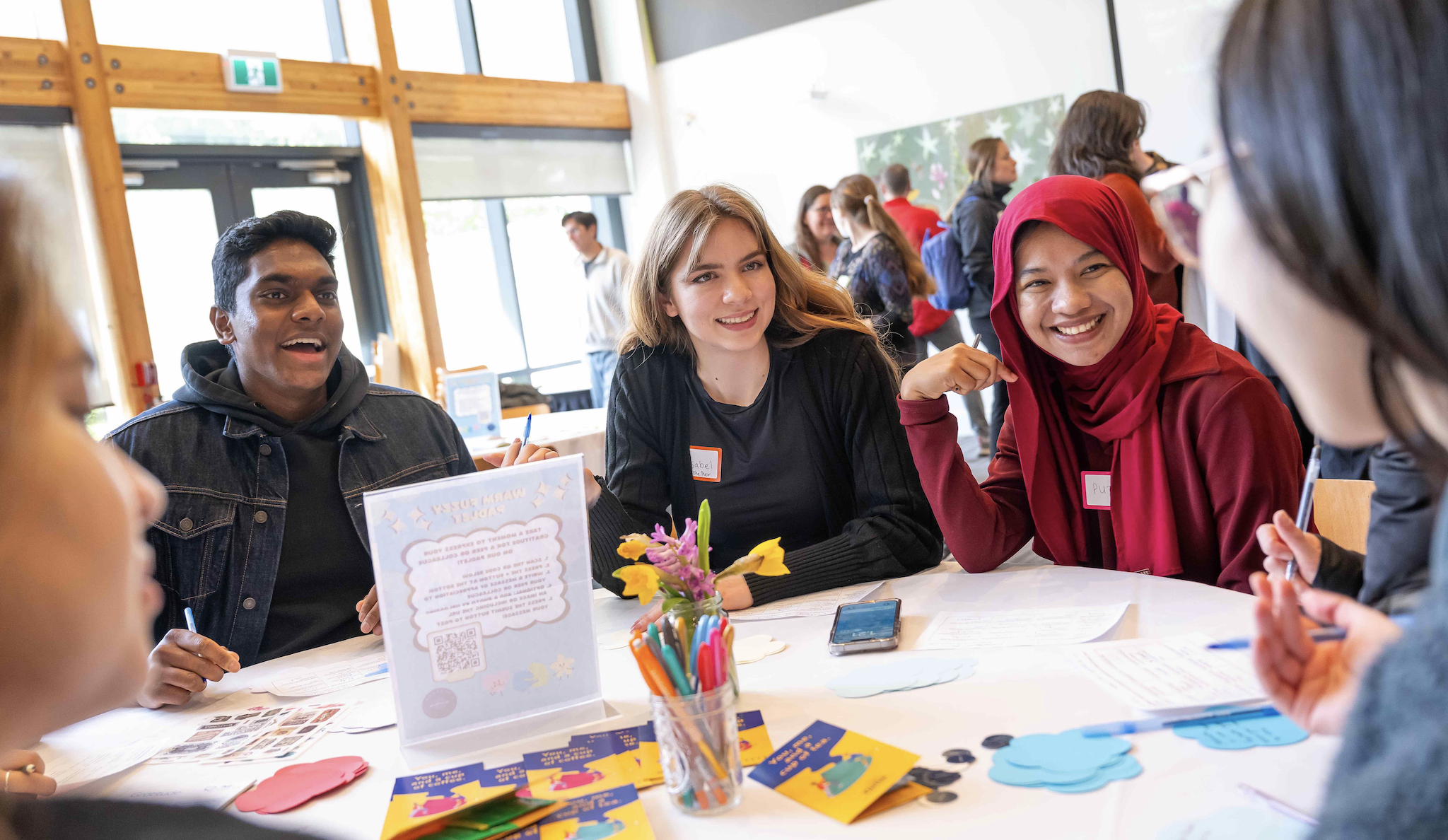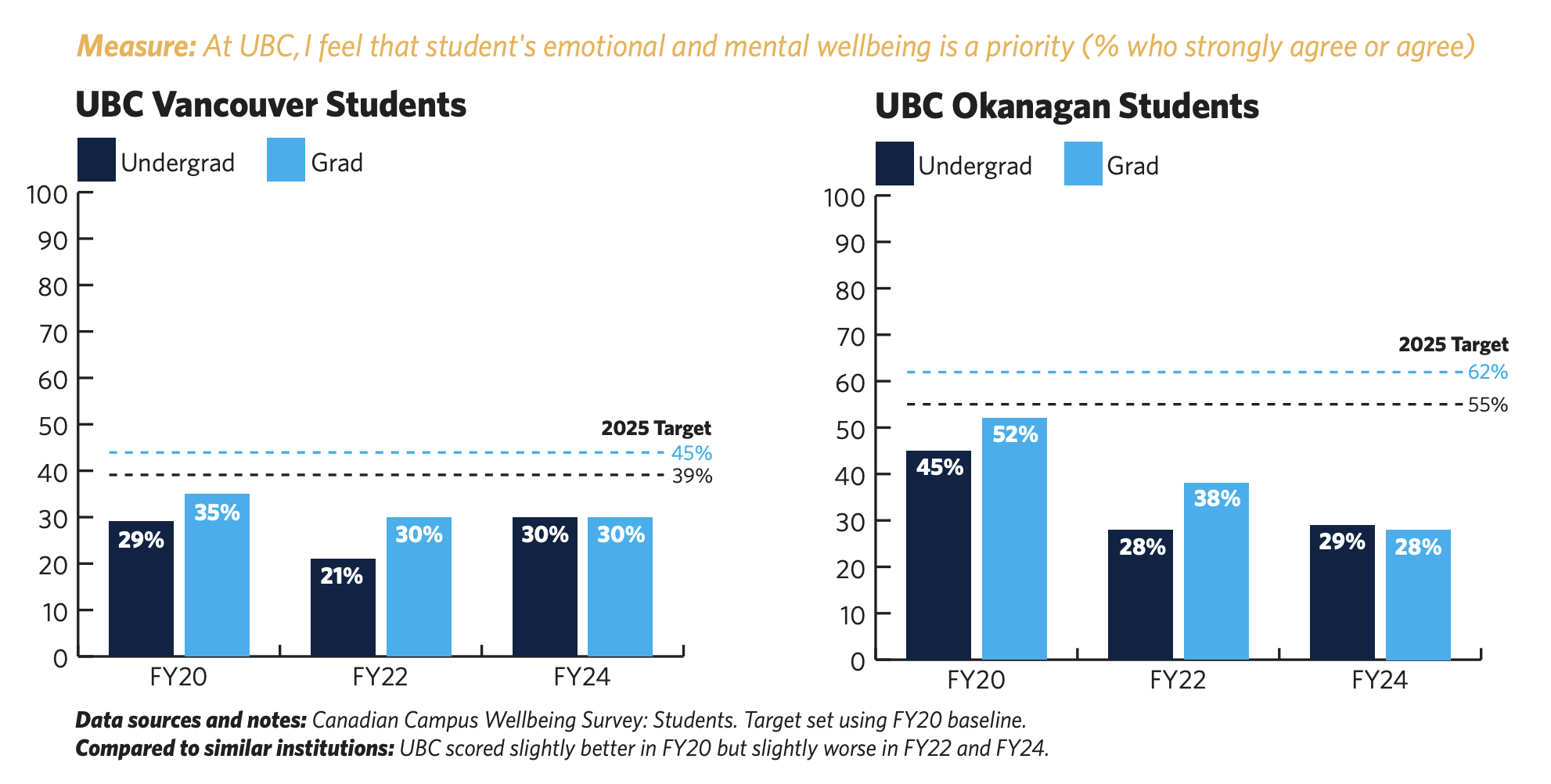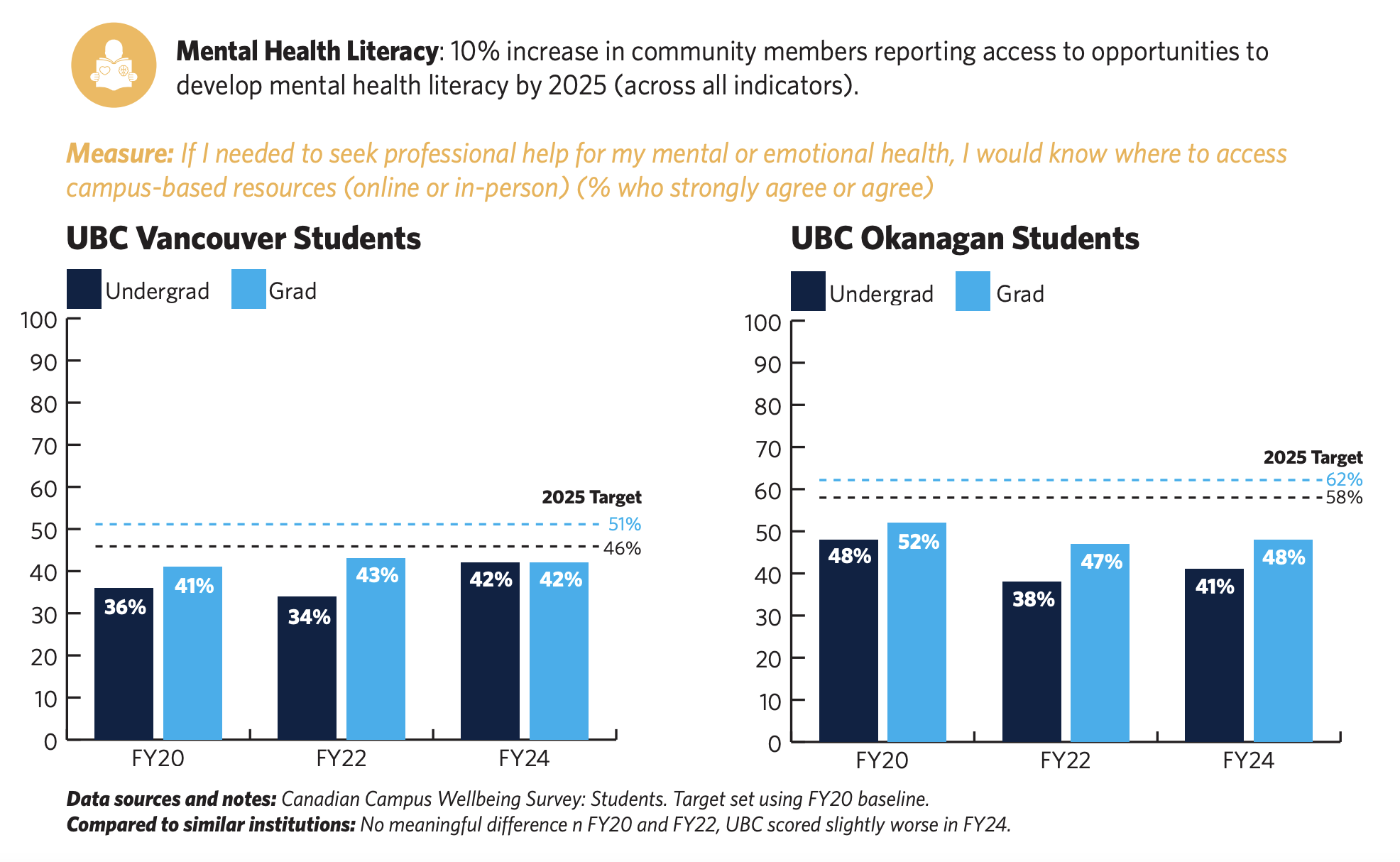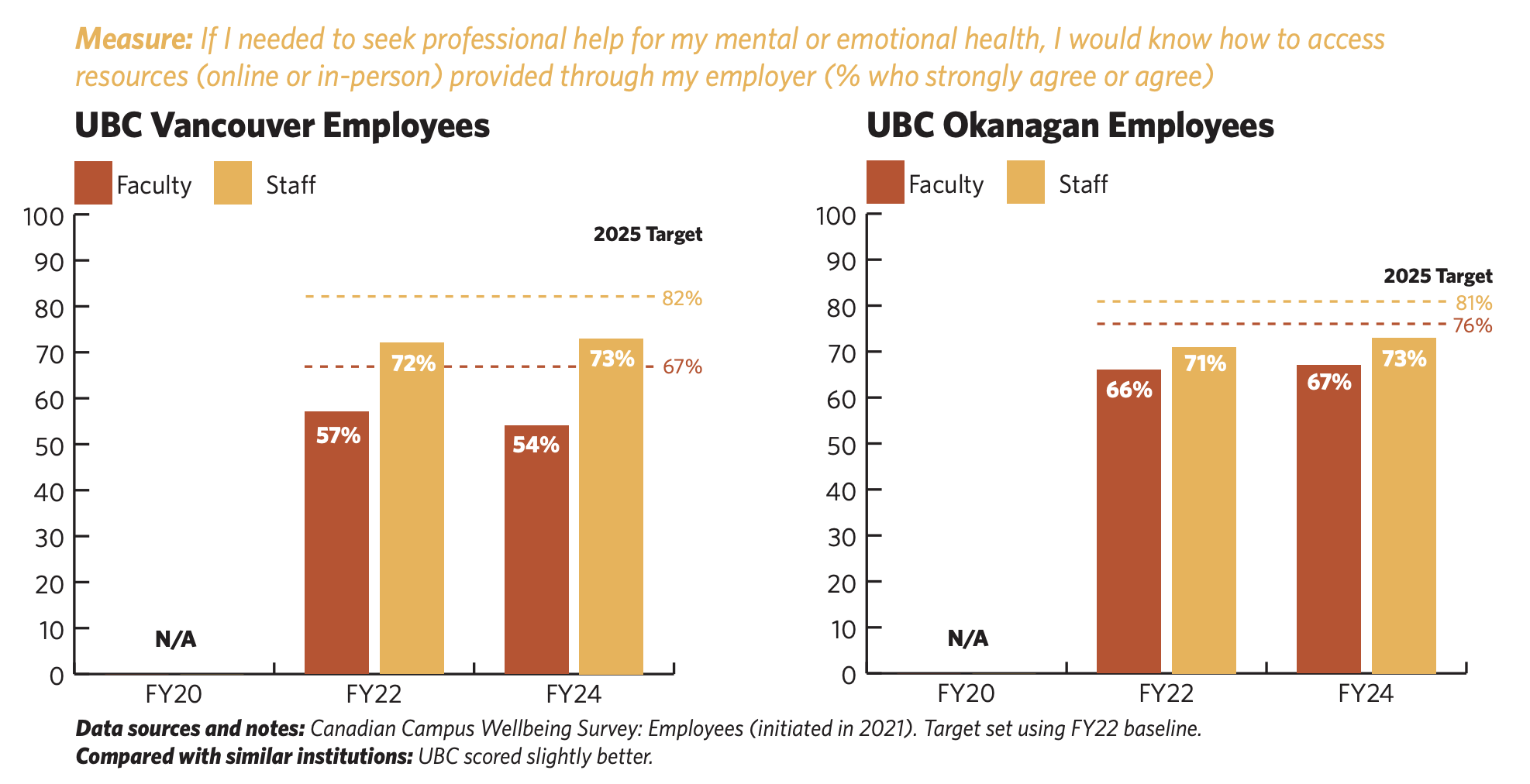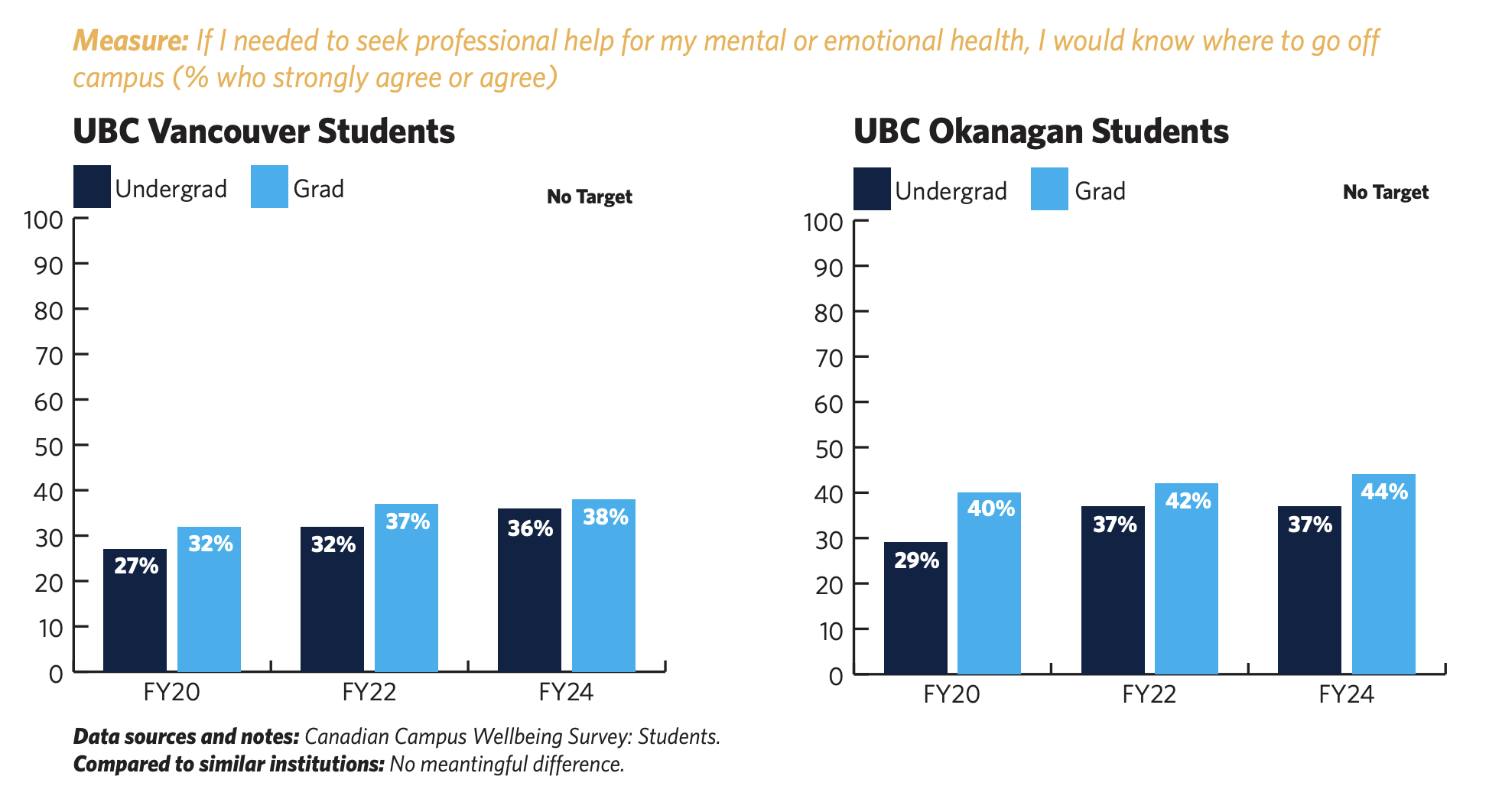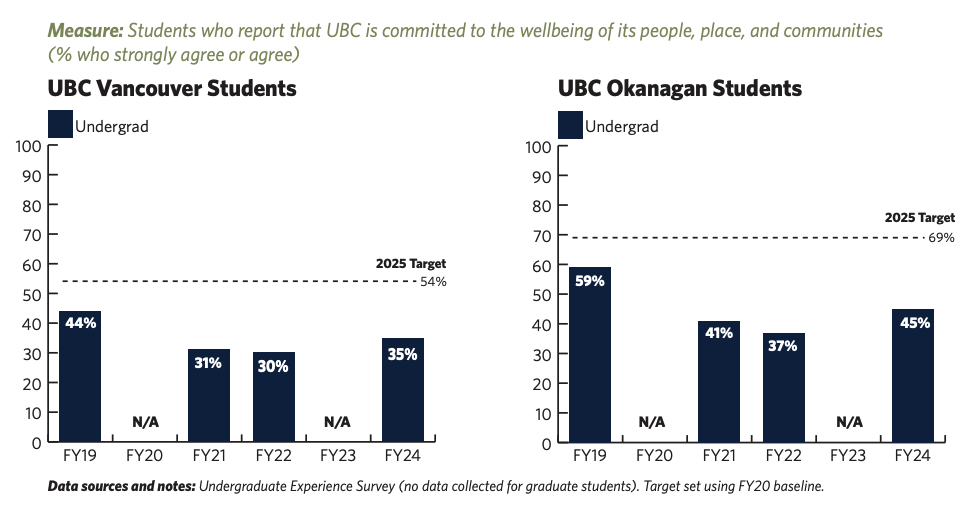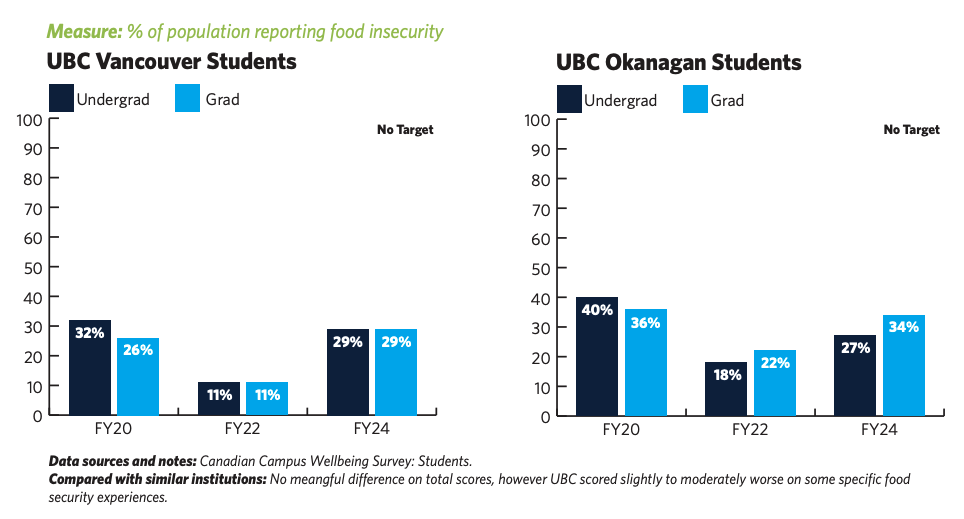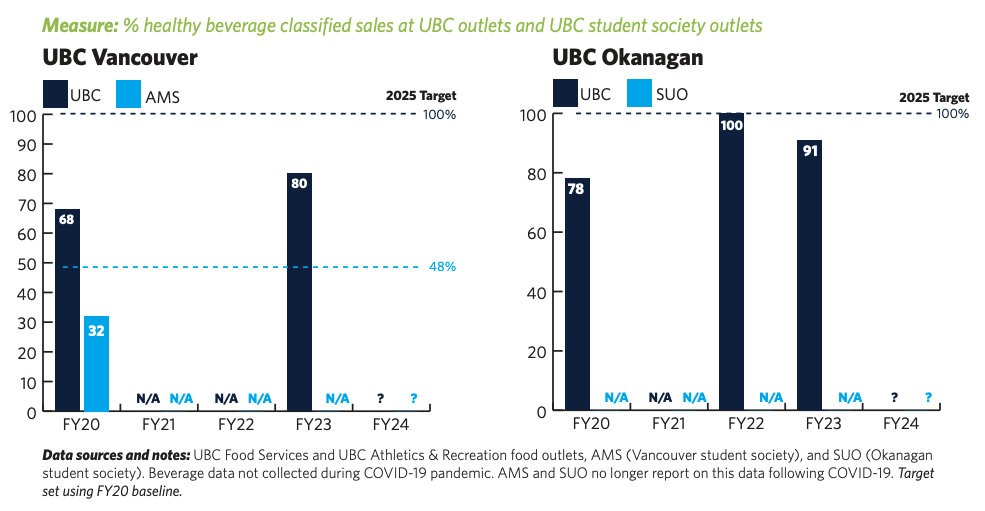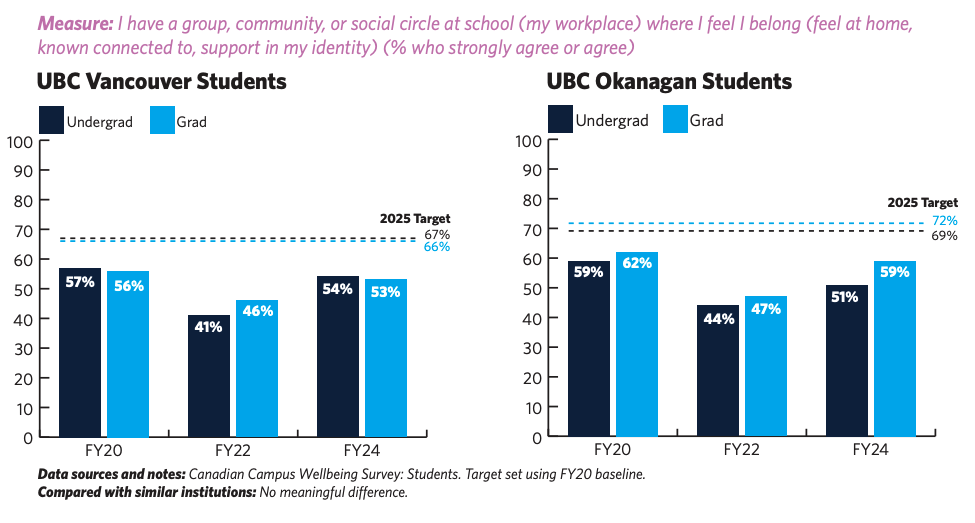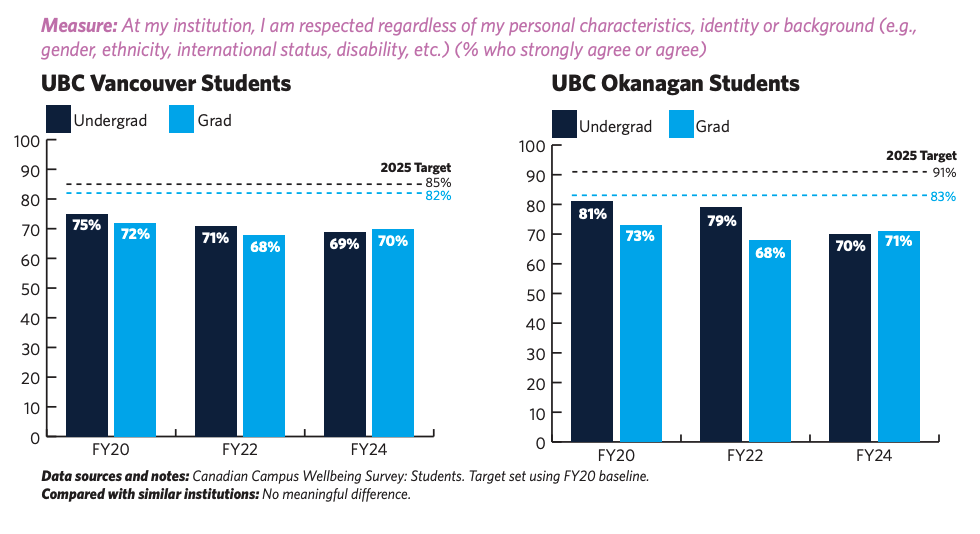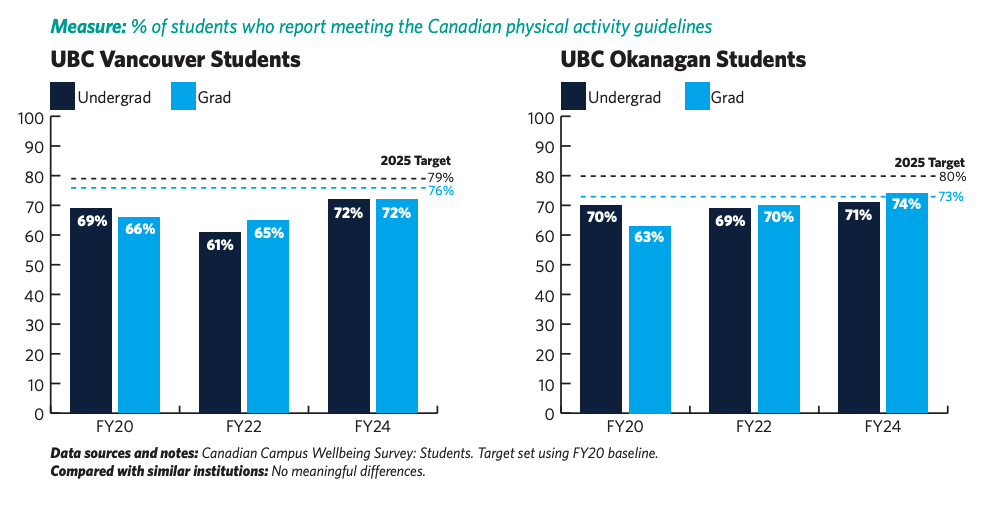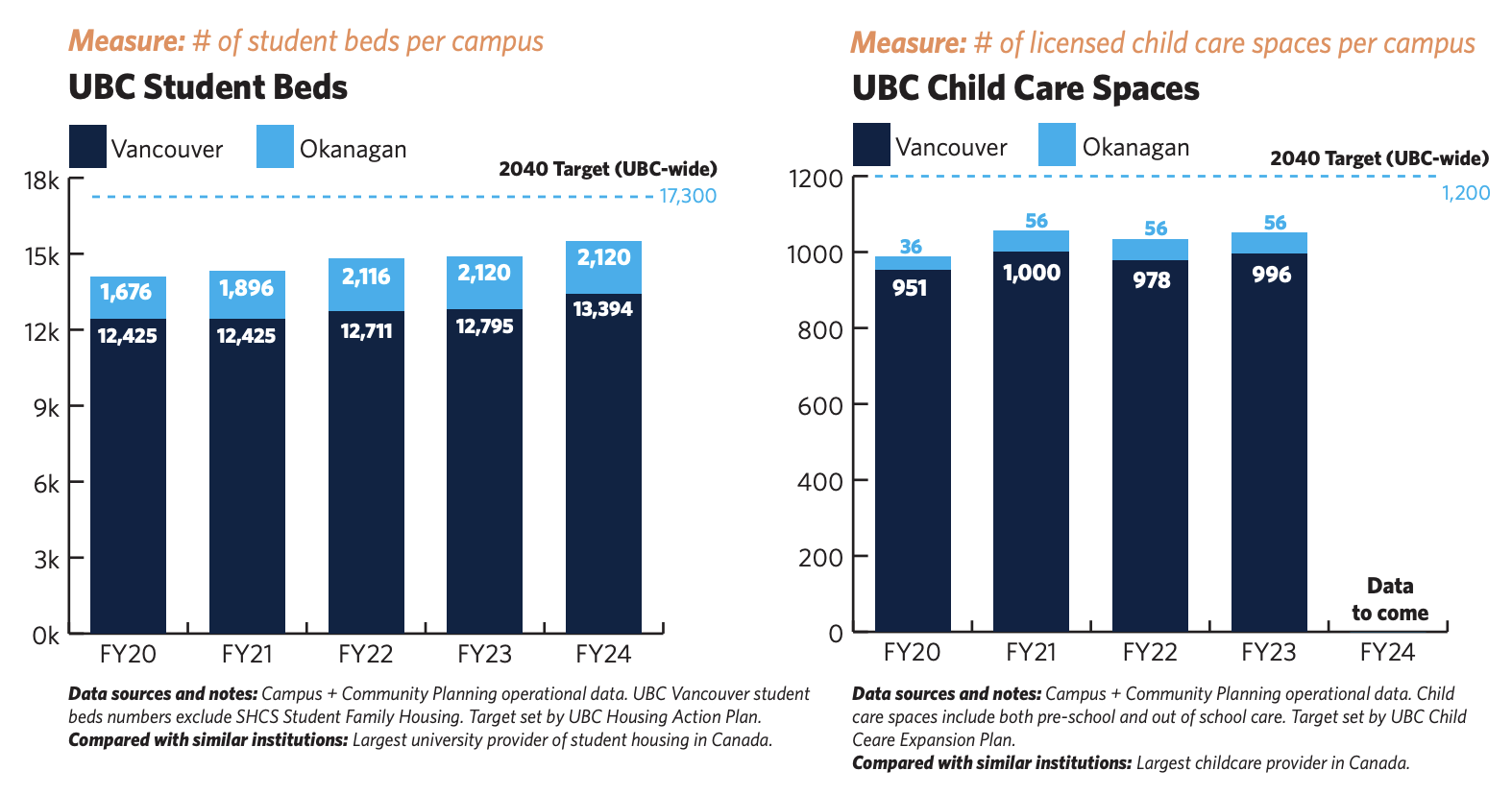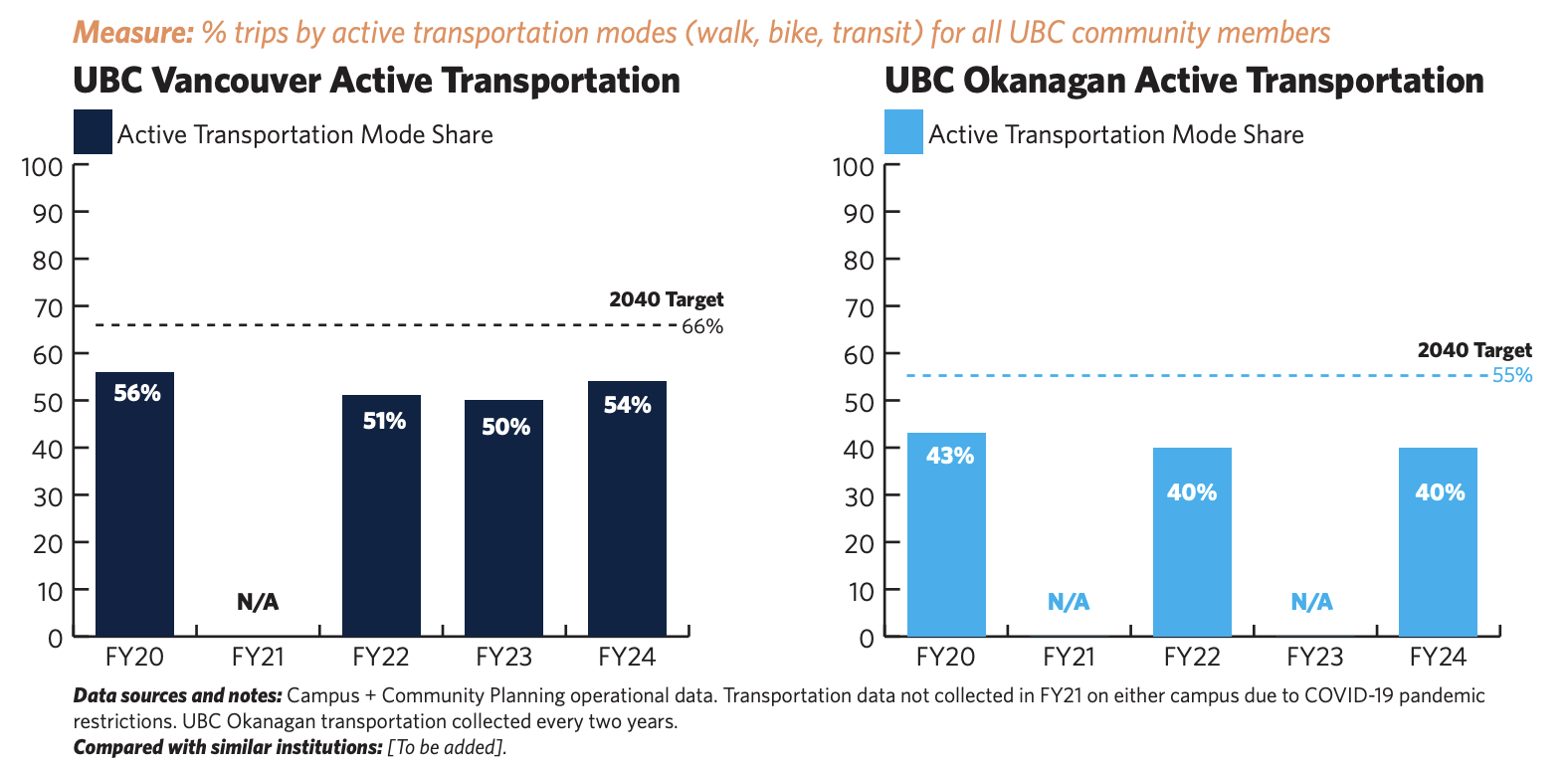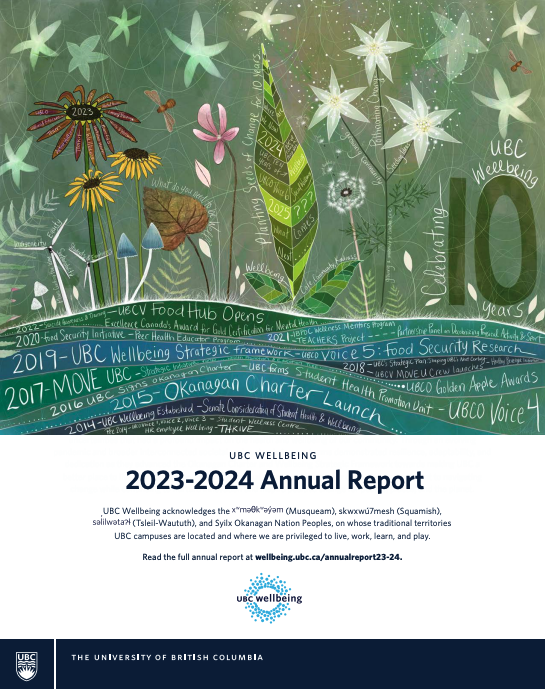Over the past fiscal year, teams from UBC Vancouver, Okanagan, and other sites across the province demonstrated resilience, adaptability, and dedication as they advanced the Okanagan Charter and Wellbeing Strategic Framework in support of campus communities where health and wellbeing are prioritized.
This annual report represents UBC’s collective commitment to addressing complex issues while continuing to nurture communities of care, mobilize innovation, and inspire positive change for people, places, and the planet.
Explore wellbeing highlights from all corners of the university in the 2023-24 UBC Wellbeing Annual Report Infographic or delve into featured stories and data metrics below that shed light on the efforts of diverse teams collectively working to enhance the wellbeing of the UBC community and beyond.
Mental Health + Resilience
Collaborative Leadership
Food + Nutrition
Social Connection
Physical Activity
Built + Natural Environments
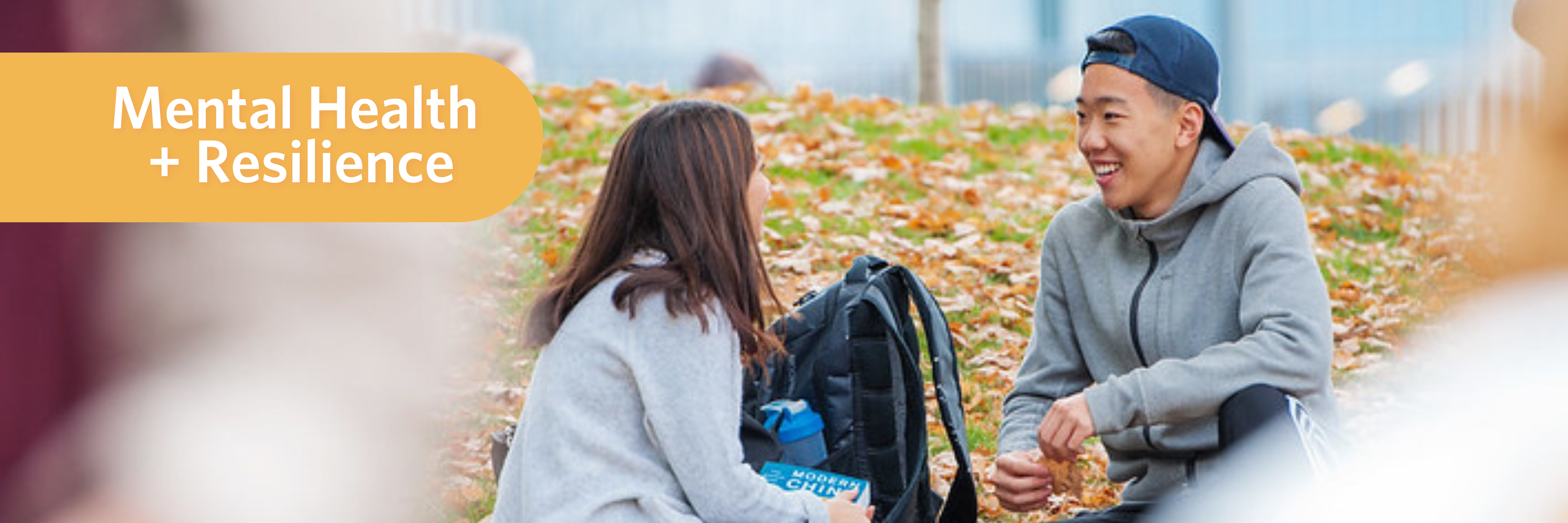
Featured Stories
Below is a selection of initiatives from 2023-24 highlighting the ongoing work to advance Mental Health + Resilience.
Launch of the Indigenous Mental Health & Wellbeing Program
In the spring of 2023, Student Health and Wellbeing’s Counselling Services launched the Indigenous Mental Health and Wellbeing (IMHW) program at UBC Vancouver campus. This initiative aims to support Indigenous students by addressing their mental health and wellbeing needs with compassion, cultural safety, and humility. From May 2023 to April 2024, the program engaged 700 students.
The IMHW program offers critical, unique services tailored to Indigenous students', including:
- Intake and wellness planning
- Crisis intervention
- Sharing and talking circles
- Engagement with Elders and other community partners
- Developing and organizing mental health education events
- Consultation for staff and faculty
- In-house training and orientation sessions
- Leadership in Indigenous mental health practices on and off campus
Additionally, the Indigenous IMHW Peer Support Program was developed as a culturally centered resource emphasizing the importance of community connection and belonging. In May 2024, the program created a shareable toolkit for use with Indigenous student groups with a particular interest in life promotion and wellbeing.
Learn more about the IMHW program
Enhancing Mental Health Supports for Black, Queer, Trans & Non-Binary Students
In 2023 and 2024, Student Health and Wellbeing’s Counselling Services hired two counsellors with expertise and aligned identities to support Black, queer, and trans and non-binary students. These counsellors will work across the Vancouver and Okanagan campuses to increase access and provide culturally responsive care for historically, persistently, or systematically marginalized students.
In partnership with UBC Beyond Tomorrow Scholars Program – an initiative that assists Black Canadian students transitioning to UBC from secondary school or another post-secondary institution – WUSC, and the Mastercard Foundation Scholars Program (which provides comprehensive scholarships to students from Sub-Saharan Africa), Counselling Services now supports students with a counsellor embedded within the programs.
Learn more about Counselling Services
Thrive 2023: A month of Wellbeing and Connection
Every November, the UBC community comes together for Thrive month to promote a culture of wellbeing and support the mental health journeys of UBC students, faculty, and staff. Now in its 13th year, Thrive aims to enhance mental health literacy, encourage healthy habits, and foster a supportive and inclusive campus environment.
This year, students, faculty, and staff led over 100 events across the Vancouver and Okanagan campuses to connect and foster wellbeing. From cozy coffees and community-led breakfasts to Q&As and research discussions, the month celebrated social wellbeing, connection, and self-care.
A key highlight was the participation of 50 Thrive partners who received grants to organize diverse mental health and wellbeing events, offering unique experiences like forest bathing, bunny therapy, and creating personalized self-care kits. One partner at UBC Vancouver campus shared how the group, “Helped form a community with people in the [program], having candid conversation about mental health and well-being in a safe, supportive environment, an opportunity to relax & spend time forming and strengthening connections."
Vancouver campus highlights
Thrive kicked off with music and social time at “Thrive by the Fire”. This event led by Campus + Community Planning in partnership with the Blank Vinyl Project and the Thrive planning committee, set the tone for the month, emphasizing the importance of community and social connection.
A first for Thrive was the Research Roundtable with over 85 participants from both the Okanagan and Vancouver campuses. The interdisciplinary panel of researchers shared insights on themes related to mental health, social wellbeing, loneliness, and connection. In addition to the moderated panel discussion, participants engaged in discussions on ways UBC can prioritize the wellbeing of our collective community.
Highlights from Okanagan campus
At the Okanagan campus, Thrive was an opportunity to move more through the Intercultural Sports, there was a chance to restore at the Rest Café, nourish together through community meals at Picnic, connect over coffee and make self-care kits, give back through the Taste of Home Food Drive, and Random Acts of Thrive (kindness), and so much more. Signature events like the Coffee Kick-off and Thrive United Way Pit Stop were well attended and reflected smiles, gratitude, and socializing.
Thrive month also marked the launch of Voice 6: Social Wellbeing where 150 student co-researchers joined the Campus Wellness and Education team to learn how students are “Thriving by Saying Hi” on the Okanagan campus.
Twelve UBCO partners received Thrive micro-grants to host community events or engage their workplace teams in exploring different perspectives to support mental health. Activities like a workplace team field trip to the En’owkin Centre, The Don’t Stress IT meet and greet, Mental Health Awareness and Advocacy Club Mental Health Q & A, and a breakfast for our Academic Champions highlighted creative ways to connect and Thrive at UBC Okanagan.
A Year-Round Commitment
While Thrive is just one month of the year, UBC's commitment to mental health and wellbeing extends throughout the year. We encourage everyone to continue championing wellbeing and exploring pathways to mental health.
Explore these resources to learn more and continue your wellbeing journey:
Building Resilience at Work: A Collaborative Initiative
Through a funding collaboration with the Employee and Family Assistance Program (EFAP) Committee, central HR at UBC's Vancouver and Okanagan campuses trained four staff members in the internationally recognized Resilience@Work program. This evidence-informed initiative is designed to enhance resilience among employees, leaders and teams helping them thrive in their professional and personal lives.
The Resilience@Work program is now an ongoing partnership between the Workplace Wellbeing and Workplace Health and Wellbeing teams, and UBC Coaching Services. This collaboration focuses on delivering comprehensive support, including assessments, debriefings, and follow-up coaching for individuals, leaders, and teams.
UBC Okanagan piloted the program in April 2023 with the Developing Leaders cohort. There are also plans to offer an open session for staff and faculty in the fall and to make the individual assessment available through UBC Coaching Services.
By integrating these assessments and support resources, UBC is committed to fostering a supportive workplace culture where mental health and wellbeing are prioritized.
Learn more about the international program
Fostering Supportive Conversations: UBC’s Suicide Awareness & Intervention Training
Launched in 2022, the Suicide Awareness and Intervention Training (SAIT) continues to foster supportive conversations and an understanding environment at UBC. This training, a collaboration between Human Resources, Health Equity, Promotion & Education (Vancouver), and Health and Wellness (Okanagan), supports the mental health and resilience of the UBC community.
In the past year, 623 students, faculty, staff, and alumni from Vancouver and Okanagan campuses participated in the training via UBC learning platforms, with 483 individuals receiving skills-focused training with a facilitator.
A participants shared their positive experience with the training. “An incredibly comprehensive course that explained the multifaceted experience of supporting someone who is considering or who may consider suicide.”
Nearly 97% of those trained through UBC learning platforms reported satisfaction with the content. Key areas of value included how to approach the conversation (16.55% of respondents), the comprehensive resource directory (13.64%), and information around suicide-safer language (12.62%).
Another participant highlighted the training’s benefits noting that, “This was a very comprehensive training. [I] appreciated the inclusion of Indigenous wisdom, mention of IBPOC and LGBTQ2S+, stigma and cultural sensitivity, the engaging colours and infographics, thoughtfulness of the training, deep dives, and the reflection questions (these felt natural) – also appreciated the sample phrases and how to ask the question - the training was great as is.”
Learn more about SAIT
Building Mental Health Literacy: Launching "Mental Health: The Basics"
To support students in developing foundational mental health literacy, UBC Vancouver’s Health Equity, Promotion & Education, Counsellors in Residence, and Student Health & Wellbeing Central teams introduced the "Mental Health: The Basics" course through its Canvas learning platforms. This course offers an introduction to key concepts surrounding mental health, helping students identify different mental health frameworks, recognize the difference between 'reasonable' and 'toxic' stress, learn ways to break the stress response cycle, reflect on the language used to discuss mental health, and identify UBC resources available to support mental health.
So far, 317 students have enrolled in this course and continue to explore these topics. By engaging with this course, students gain valuable knowledge and skills to manage their mental health effectively, fostering a healthier campus community.
UBC ARTIVISM: Madness & the Masses
From September 6 to October 13, 2023, the UBC Arts and Culture District presented the 7th annual UBC ARTIVISM festival, highlighting stories of resilience and student activist art that challenged dominant narratives through live performances, poetry, music, art, theatre, and more. This year’s festival drew over 1,400 attendees through a diverse array of engaging activities.
Maryum, a UBC undergraduate student, reflected on her experience at the festival: “Being able to share my own work, learn from other artists, and hear diverse people from marginalized communities share their cultures through poetry and song has been an enriching experience. I found so much love and joy and a space of collective catharsis through these events!”
The UBC ARTIVISM Reveal/Reform Art Exhibition at Hatch Gallery drew a capacity audience on opening night, featuring artists performing in in five languages: English, Vietnamese, Chinese, Ukrainian and Tagalog. This 18-day exhibition included an audible walkthrough for visually impaired guests.
Collaborations with community partners such as BC Culture Days, Vancouver Art Gallery, Vancouver International Film Festival, and Playback Theatre, along with seven campus partners including the Chan Centre, Belkin Gallery, and MOA, and nine student clubs, created a strong network of connections. Together, the festival organized and presented 12 events and looks forward to planning for 2024.
Learn more about UBC ARTIVISM
Targets & Indicators
Below are data metrics for the Wellbeing Strategic Framework targets and indicators relating to Mental Health + Resilience.
![]()
Metrics
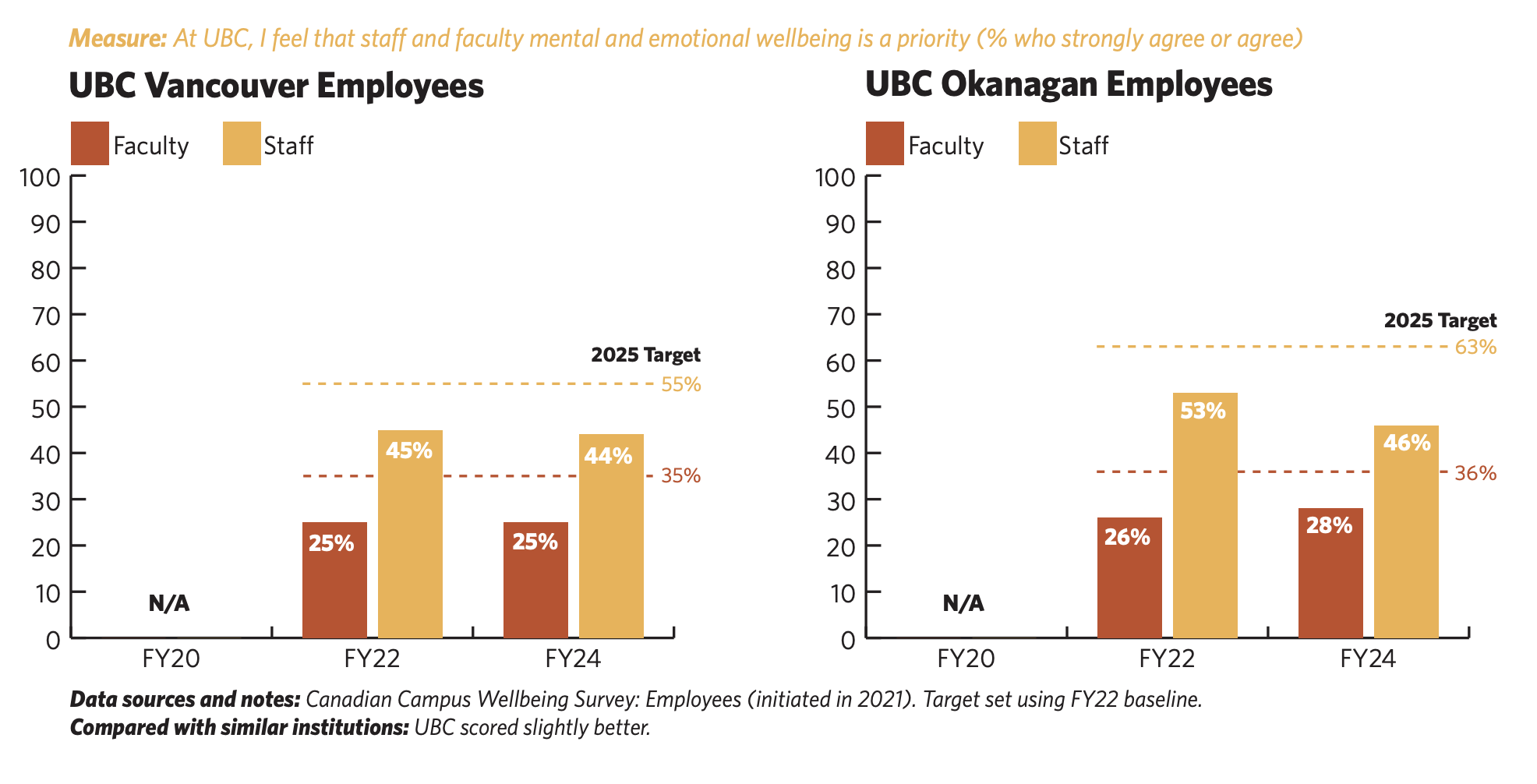
![]()
Metrics

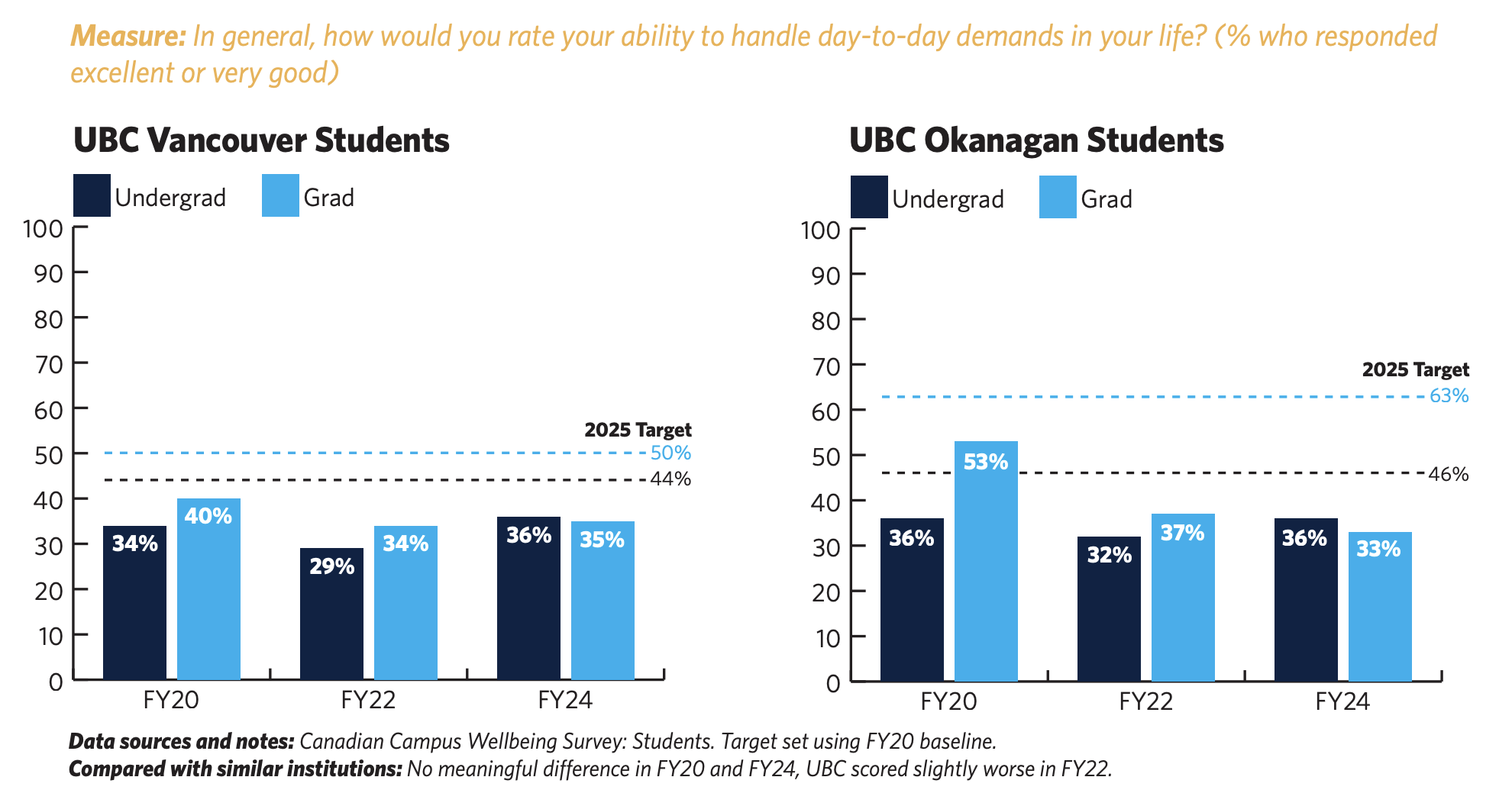
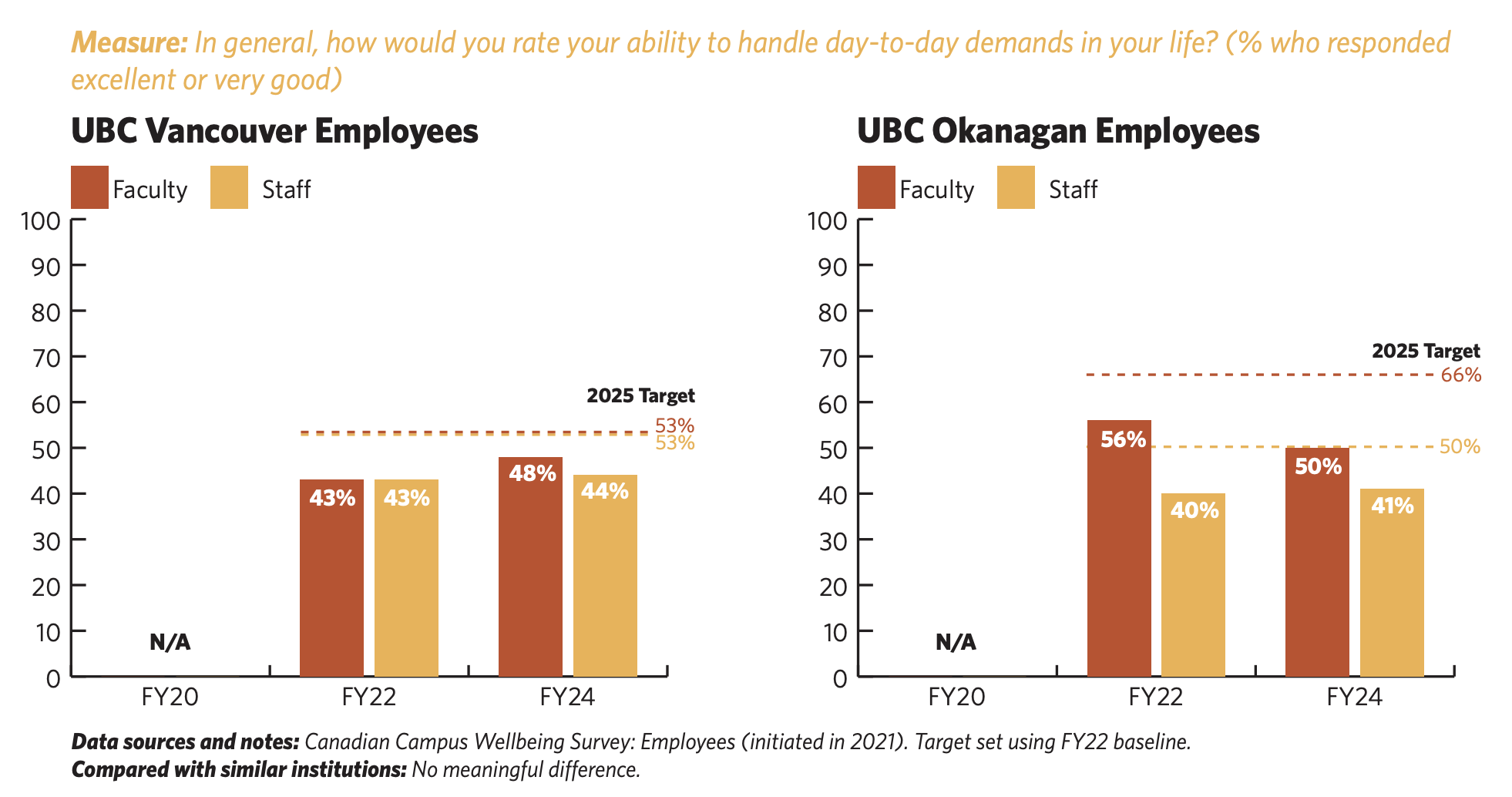
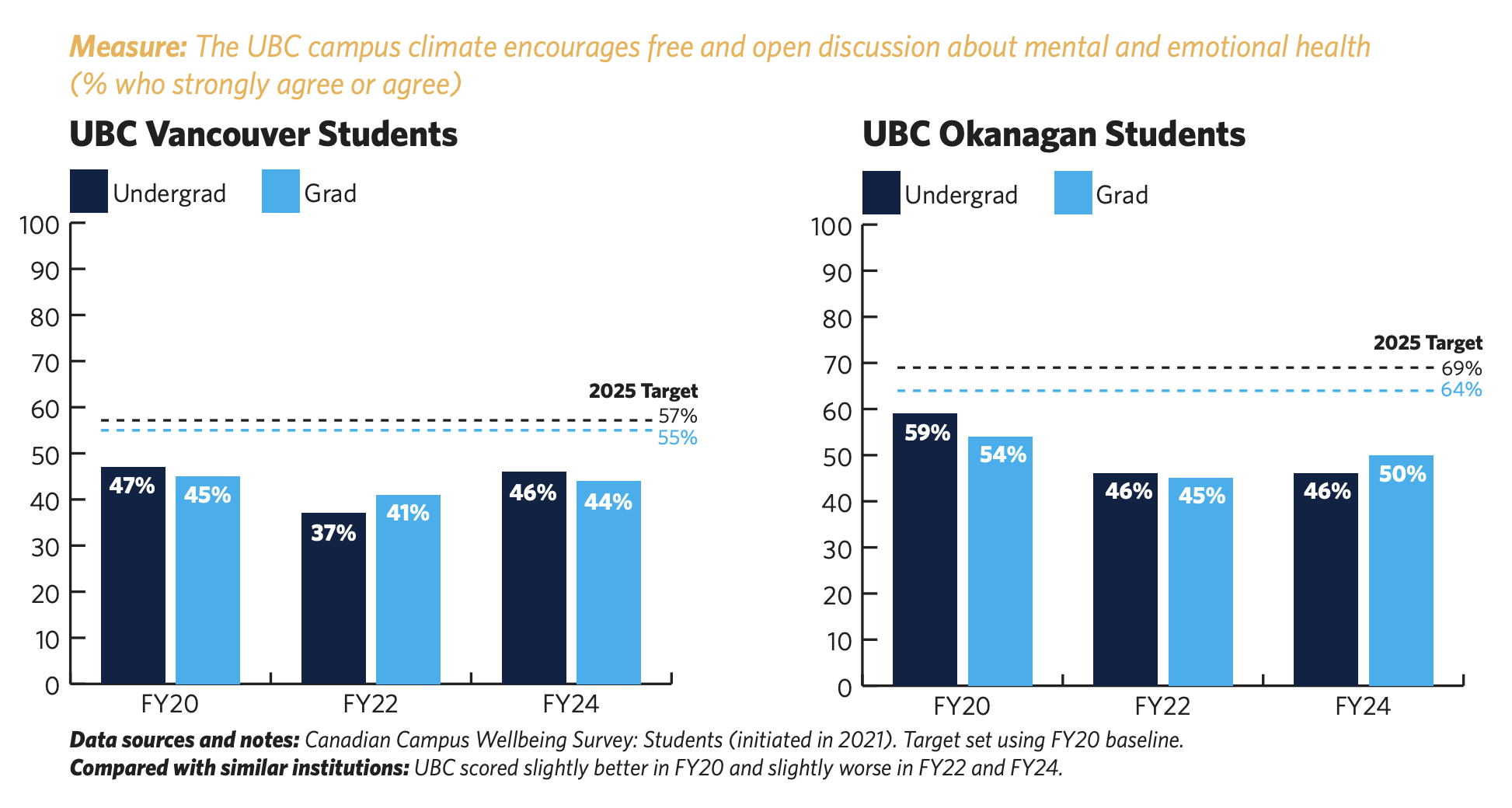
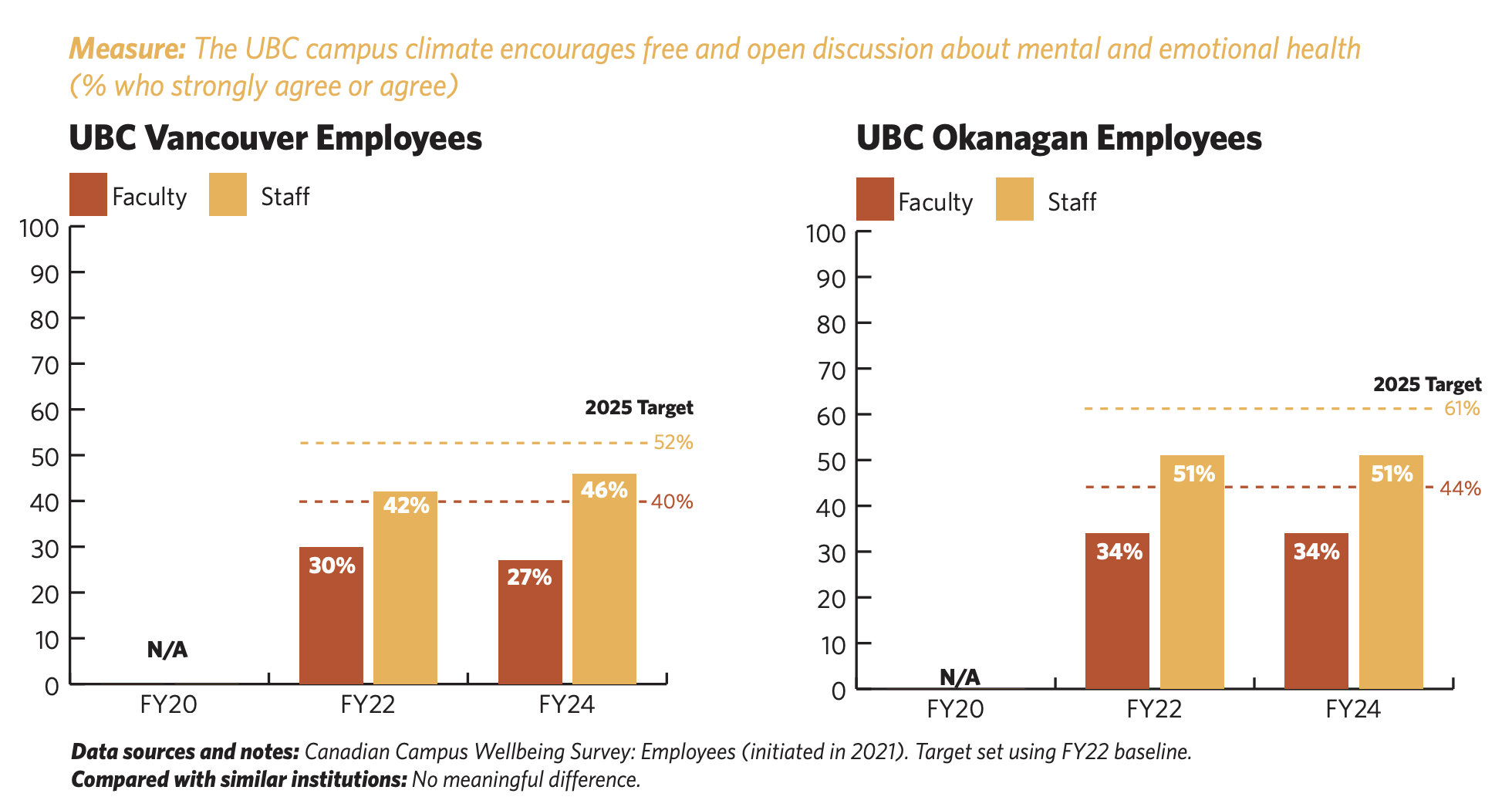
Featured Stories
Below is a selection of initiatives from 2023-24 highlighting the ongoing work to advance Collaborative Leadership.
UBC Wellbeing Celebrates 10 Years
In 2024, UBC Wellbeing reached a significant milestone, marking a decade since its establishment. On April 4th and 10th, over 150 students, faculty, staff and community members from Vancouver and Okanagan campuses, respectively, gathered to celebrate the collective efforts that have made our university a better place to live, work, learn, and play.
Formed in 2014, UBC Wellbeing emerged as a collaborative, whole-university initiative to embed health and wellbeing in all aspects of university culture and life. Guided by the Okanagan Charter for Health Promoting Universities and the Wellbeing Strategic Framework, wellbeing work has been woven through strategic plans, featured in research, and integrated in a range of programs, campaigns, and initiatives led by teams and units across the university.
Reflecting on UBC Wellbeing’s milestone, Matt Dolf, Director of the Office of Wellbeing Strategy and a key staff member since its founding years, shared, “The journey of UBC Wellbeing over the past decade has been remarkable, and reflects our shared commitment to cultivate a culture of health and wellbeing through a systems-wide approach across our campuses.”
Celebratory events held on both campuses offered attendees the opportunity to connect with peers and colleagues, engage in interactive student-led activities, enjoy plant-forward refreshments, and hear inspiring stories from collaborators and leaders.
At the Okanagan campus, the anniversary celebration was a part of the annual Classroom Wellbeing and Accessibility Awards (formerly the Golden Apples Awards). Led by students and supported by Campus Wellness and the Disability Resource Centre, these awards recognize the contributions of staff and faculty who have championed student health, wellbeing or accessibility. This year, over 250 student-written nominations were received, with 12 recipients selected for the awards.
Reflecting on the anniversary celebration, Nikki Reiter, Continuous Improvement Program Manager, Project Management Office at UBC Okanagan, shared, “The anniversary celebration was a testament to the dedication and passion of our community members who continuously strive to create an inclusive and supportive environment for all at UBC Okanagan.”
These in-person gatherings served as important reminders of the progress made to advance health, equity, sustainability, and wellbeing at UBC, while also highlighting the ongoing commitment and collaborative effort needed to further build healthy campus communities across our university.
Alex Bayne, Managing Director of Human Resources at UBC Okanagan, emphasized, “Over the past 10 years I have seen faculty and staff support the health and wellbeing of students, colleagues and our community members on both campuses. The actions we have collectively taken remind us to focus on our own health and wellbeing and that of others. These actions have helped underpin the social fabric of our university culture.”
StEAR Enhancement Fund Supports Commitments to Advancing Equity & Anti-Racism
In September 2023, the Equity & Inclusion Office (EIO) launched theStrategic Equity and Anti-Racism (StEAR) Enhancement Fund to support student, faculty and staff-led initiatives aimed at advancing equity and anti-racism priorities across UBC Vancouver and Okanagan.
This reimagined funding program provides an annual recurring investment of $100,000 from the EIO to sponsor community-led initiatives. For the 2023/2024 academic year – and to kick–off the relaunch – UBC provided an additional $200,000 for a total of $300,000 in available funding. The fund is designed to contribute to the broad goals of UBC’s StEAR Framework and Roadmap for Change.
Between September 2023 and March 2024, the fund received 118 applications. Of these, 41 projects were funded, distributing a total of $294,385.80 to initiatives advancing racial, disability, gender, and 2SLGTBQIA+ equity.
“The StEAR Enhancement Fund is an important mechanism to promote community engagement and projects that address needs specifically identified by students, faculty and staff,” said Arig al Shaibah, Associate Vice-President, Equity and Inclusion.
A new committee, jointly administered by the EIO and the Office of the Vice-President Students and comprising students, faculty and staff across both campuses, has been formed to evaluate submitted proposals. The fund is again open to applications from September to December 2024.
The StEAR Fund is designed to contribute to the broad goals of the university’s StEAR Framework and Roadmap for Change.
Learn more about the StEAR Fund
Launch of Funding to Enhance Wellbeing in Teaching, Learning & Research Environments
In the fall of 2023, the Office of Wellbeing Strategy launched a new funding stream to enhance wellbeing in teaching, learning, and research environments across Vancouver and Okanagan campuses. This initiative, a new component of the UBC Wellbeing Strategic Initiative Fund, aims to support capacity-building initiatives that advance UBC's Wellbeing Strategic Framework.
In February 2024, seven Teaching, Learning and Research Environments Stream Projects led by faculty and staff at UBC Vancouver and Okanagan were selected to receive grant funding through this new stream. A further 26 projects were supported by the UBC Wellbeing Strategic Initiative Fund for the 2023/24 fiscal year.
From working with Syilx Elders and Knowledge Keepers on Okanagan campus to explore Indigenous assessment and possibilities in education to improving mental health and social connection through dog therapy on Vancouver campus, this year's projects showcase the diverse ways in which faculty and staff are embedding sustainable health and wellbeing strategic initiatives within teaching, learning, and research environments.
Learn more about funded projects
Launch of the Climate & Wellbeing Education Grants program
In partnership between the Sustainability Hub and the Office of Wellbeing Strategy, the Climate and Wellbeing Education grants program brought together 13 faculty members from 11 departments and seven faculties to integrate climate change and wellbeing content into their teaching, reaching over 3,000 students annually, with support from over $60,000 in grants.
Project topics included:
- Planetary health in medicine and pharmacy education
- Climate action and children’s literature
- Intersections between climate change and pandemics
- Climate connections to health
- Nutrition and wellbeing
- The role of emotions in climate and sustainability education
- Justice, power and the politics of climate change
- Climate and wellbeing in forestry education
- Climate justice and student wellbeing in the classroom
- Climate change in environmental engineering
Feature Video: Local Stories of Climate and Wellbeing
One project, supported by the Climate & Wellbeing Education Grant, produced a video highlighting the experiences of a resident living in subsidized housing for seniors in Vancouver’s Chinatown. The video explores how extreme temperatures in Vancouver affect various aspects of her and her neighbours’ lives.
This video is part of the ‘Kin(esiology) in Climate: Health Stories from Our Shared City’ project. For more information on how kinesiology can inform conversations around climate justice, see here.
Learn more about Climate & Wellbeing Grants
Enhancing Wellbeing in the Workplace: Activate Wellbeing Toolkit
The Activate Wellbeing Toolkit (AWT) engages staff and faculty at all levels to identify and accelerate actions in policies and practices towards stronger mental health and wellbeing in the workplace. Since its launch in fall 2022, ten units have undergone the strategic planning and dialogue process. Central HR at UBC Vancouver and Okanagan campuses, in partnership with the Office of Wellbeing Strategy, continue to refine and facilitate this process.
Participating units have prioritized and begun moving forward on a range of actions, including:
- Conflict training
- Creating and running an internal survey to gauge wellbeing and workplace culture
- Formalizing ongoing commitments to health and wellbeing
- Training managers and leaders to engage in wellbeing conversations
Creating opportunities for social connection
Day of the Dot: UBC Okanagan Period Equity Project
In March 2023, Campus Health & Education Nurses partnered with the UBC Okanagan Student Union to host the Day of the Dot event in Picnic, funded by the Student Experience Office for Climate Action Month. The initiative aimed to address period poverty through education and the distribution of free sustainable period products on UBC Okanagan campus.
During the event, attended by 56 students, a presentation covered period poverty and the environmental impact of single-use period products. Attendees learned about reusable options, updates on the project’s progress, and received a free product of their choice. The event received positive feedback, with attendees expressing gratitude for the informative presentation and feeling safe in the inclusive environment.
Learn more about Health & Wellness at UBC Okanagan
Raising Climate Consciousness: UBC Okanagan’s Teach-In on Climate & Justice
UBC Okanagan’s participation in the Worldwide Teach-In on Climate and Justice has not only been a success but a testament to the collective dedication towards addressing the emerging need for climate/justice awareness and action. This event was made possible through the support of the UBC Okanagan Climate Action Plan Engagement (CAP-E) working group, a team of faculty, students and staff that meet regularly to identify engagement opportunities that support the advancement of the UBCO Climate Action Plan 2030 reduction targets.
The third UBCO Teach-In on Climate & Justice was comprised of welcoming remarks provided by Bill Cohen, PhD., Assistant Professor in the Okanagan School of Education and Indigenous scholar from the Okanagan Nation along with three sessions aimed at deepening an understanding of the research underway at both UBC Okanagan and within the Kelowna community. Central to the event was an effort to highlight pressing issues at the intersection of climate and justice, which included the increasing risks of wildfires, challenges in waste management and the disproportionate exposure of marginalized communities to environmental hazards.
The first session featured an info-fair and networking opportunity to encourage connections, and contemplative reflections aimed at driving climate and justice research and actions forward. Subsequently, the City of Kelowna and the UBCO Sustainability office delivered insightful presentations led by Leanne Bilodeau, Associate Director of Sustainability Operations, the Sustainability Office – Campus Planning and Chris Ray, Climate Action, and Environment Manager for the City of Kelowna. These presentations illustrated the development of policy and plans to tackle the current and future problems and solutions of climate/justice.
The event concluded with dynamic table discussions, serving as a forum for participants of the Teach-In to strategize on the implementation of solutions concerning the action of climate knowledge on campus and in the community. This open discussion encouraged the exploration of climate/justice-related issues in the categories of justice, activities, agents of change and reflection. Across these areas, topics encompassed the increase of resilient infrastructure, climate emergency preparedness, the support of Sylix sovereignty and Indigenous leadership, and the transition to zero-carbon buildings and energy systems on campus.
The Teach-In concluded by offering participants of the event the next steps they could take to translate their gained insights into action. The CAP-E network invites you to join their working group and to take the UBCO Climate Action Pledge.
Targets & Indicators
Below are data metrics for the Wellbeing Strategic Framework targets and indicators relating to Collaborative Leadership.
![]()
![]()
Metrics
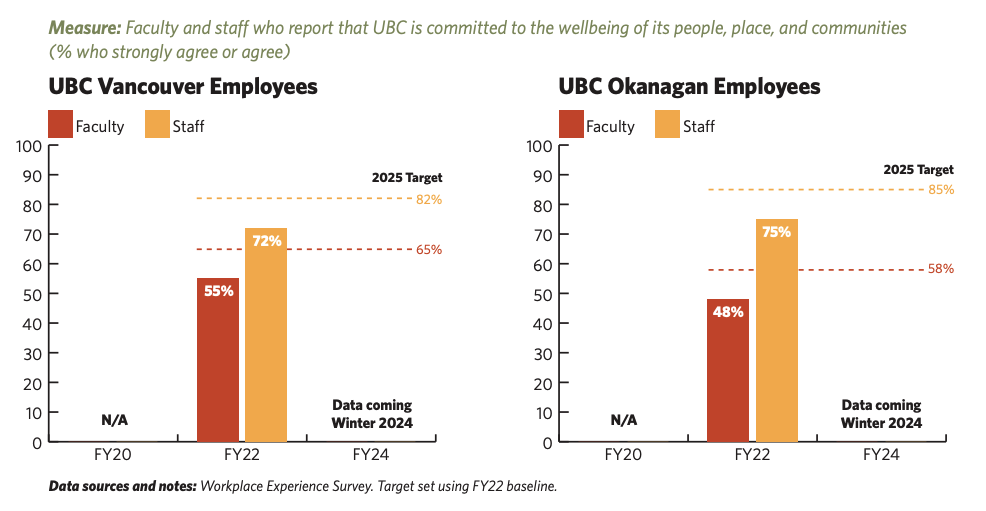
Featured Stories
Below is a selection of initiatives from 2023-24 highlighting the ongoing work to advance Food + Nutrition.
UBC’s Food Systems Committee Launches
In 2024, the UBC’s Food System Committee (FSC) was established as a multi-stakeholder, interdisciplinary hub comprising students, operational staff, community partners, academics, and researchers from UBC’s Vancouver and Okanagan campuses. Its goal is to catalyze transitions towards sustainable, healthy, secure, and just food systems at UBC and beyond.
The FSC emerged from discussions among long-standing committees, the UBC Food System Project and the UBC Wellbeing Food & Nutrition Committee, which merged into a united partnership. This consolidation represents an opportunity to strengthen collaboration and realize a greater collective impact across interconnected university priorities, including food-related health and wellbeing, food systems sustainability, and food security.
Co-chaired by UBC SEEDS Sustainability and UBC Food Services, the initiative scales collaborations and applied research, utilizing the "Campus as a Living Lab.” It aims to lead and inspire collaborative action to advance UBC’s transition towards a sustainable, healthy, secure, and just food system.
Nurturing Student Wellbeing & Community: UBCO Wellness Hub in Picnic
Since its opening in 2023, UBC Okanagan’s Wellness Hub in Picnic led by Campus Wellness & Education in collaborative leadership with the Student Union and Food Services, has continued to grow its programming, enhancing student wellbeing and fostering a sense of community and belonging. In the past year, the Food Skills Workshops provided 24 peer-led sessions, engaging 150 unique participants in improving cooking skills and fostering social connection. These workshops, held twice weekly from September to April, featured primarily plant-based recipes from diverse cuisines and quickly sold out, reflecting their popularity among students. One student participant shared, “I’ve been introduced to a few recipes that are budget friendly, and relatively easy to prep – which was a lifesaver during the term.”
Another highlight from the past year was the Grab and Go Breakfast program, which provided free breakfasts to an estimated 11,874 students throughout the academic year, helping support food security on campus. The Community Meals initiative, offering vegan, allergen-minimal meals, served an average of 117 people per meal, promoting inclusive community engagement. One participant shared their gratitude for the program, stating, “Food has become a luxury for me since I relied so heavily on the food bank – this is appreciated.”
Additionally, the Community Market hosted 12 events with 6-10 vendors each, and the Outreach Cart, stocked with wellness resources and snacks, reached busy areas on campus weekly, averaging 152 interactions per run. These programs reflect the Wellness Hub in Picnic’s commitment to supporting student wellbeing through accessible, nutritious food options and community-centered activities.
Food Hub Market: Serving At-Cost Foods & Cultivating Community Connections
Since opening in 2022, the Food Hub Market (FHM) has become a vibrant hub for providing at-cost foods and fostering community connections in the Centre for Interactive Research on Sustainability (CIRS) Building on Vancouver campus.
In the past year, the FHM facilitated 29,583 transactions, selling 141,237 items and organized 21 programming events with 10 food and nutrition booths. These initiatives focused on community building, food waste education, sustainability, financial literacy, and more, attracting over 600 students and partnering with 15 campus organizations. One student participant shared, “I love the events arranged by food hub market and the community engagement it brings about.”
The FHM also engaged 44 volunteers, hosting seven volunteer dinners to enhance their wellbeing through access to affordable food, nutrition knowledge, social bonds, and career skill development. One student volunteer expressed, “I love being a member of FHM. I love the inclusive and respectful environment.” Summer operations were supported by two Work Learn students and approximately 30 volunteers, expanding to 35 volunteers by fall 2023 and 44 by spring 2024.
Learn more about the Food Hub Market
Local Supplier Spotlight Brings a Taste of BC to Vancouver’s Campus
From October to December this past year, UBC Food Services launched the Local Supplier Spotlight series, showcasing their BC-based partners who supply local food to UBC's residence dining halls.
This initiative underscores UBC Food Services' commitment to working with and supporting our local community to nourish the students, faculty, staff, and visitors of UBC. Their culinary teams prepare wholesome, sustainable, and diverse foods, using as many local ingredients as possible. They define local food as food that is grown, raised, caught, or processed within British Columbia—and as close to UBC as possible.
David Speight, UBC’s Culinary Director and Executive Chef, highlights the mutual benefits of these collaborations.
“This series is a great way for us to introduce values-aligned local food businesses to our students and guests. It’s important for us to support small-scale, local food businesses as we know that the money that we spend with local businesses supports the local economy and provides an opportunity for an emerging food brand to showcase their products to a wide range of guests.”
Did You Know?
- Almost 50% of UBC Food Services’ food ingredients are purchased from local producers.
- UBC Food Services partners with the UBC Farm and local suppliers to bring in over 50,000 lbs of fresh produce per year.
To follow the Local Supplier Spotlight, follow @UBCFoodie on Instagram to stay up to date on the suppliers who will be on campus.
Cultivating Connections: Roots on the Roof’s Summer Mentorship Program
Roots on the Roof’s Summer Mentorship Program offers a beginner-friendly introduction to gardening at their 192m^2 rooftop garden. From mid-May to late June, the program guides 20 mentees through various components of farming, including plant identification, seed starting, weeding, composting, seed saving and harvesting.
The mentorship also introduces students to other campus food initiatives through distribution efforts after harvest, demonstrating how these initiatives support each another and the role of food hubs. As one mentees, Mina, described it, the program provides “a broader picture of food production that relates to other disciplines like history, culture, and politics”.
While gardening under the summer sky, students are invited to engage in food-related conversations, inspiring healthier relationships with food and a deeper understanding of food sovereignty.
Learn more about Roots on the Roof
Targets & Indicators
Below are data metrics for the Wellbeing Strategic Framework targets and indicators relating to Food + Nutrition.
![]()
Metrics
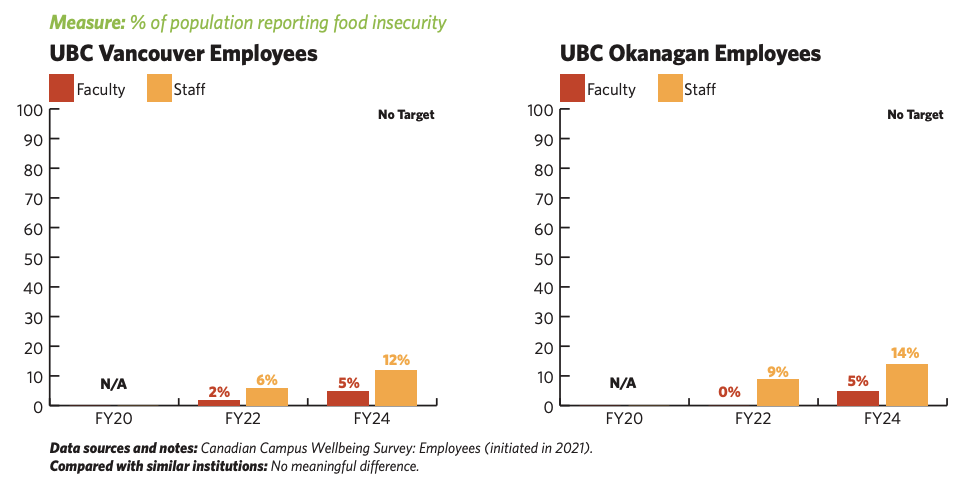
![]()
Metrics

Featured Stories
Below is a selection of initiatives from 2023-24 highlighting the ongoing work to advance Social Connection.
Launch of UBC’s Inaugural Accessibility Committee
In 2023, UBC launched its inaugural Accessibility Committee, a diverse and interdisciplinary group providing ongoing guidance and advice to the university on identifying, removing, and preventing barriers to accessibility across the Vancouver and Okanagan campuses. Comprised of students, faculty, and staff, the committee advises on the development and implementation of the UBC Accessibility Plan and ensures the university meets its legislative obligations and commitments to disability equity priorities.
The committee's work is guided by a mandate and diverse membership, including a broad diversity of persons living with disabilities across an intersection of identities and representing lived experiences from a full range of historically, persistently, or systemically marginalized communities. Supported by the Equity & Inclusion Office and co-chaired by selected members, the committee collaborates through working groups to address specific accessibility issues and align with UBC’s Strategic Equity and Anti-racism (StEAR) Framework and Roadmap for Change.
Uplifting & Recognizing UBC's Transgender & Non-binary Community
On March 31, 2024, UBC celebrated Transgender Day of Visibility, recognizing and uplifting transgender (trans) and non-binary community members and their contributions. Amid a broader, continued trend of intensified, hate-filled anti-trans efforts, UBC remains committed to providing a safe and welcoming environment for trans and non-binary students, faculty, and staff. The university celebrates the strength, resilience and joy of trans and non-binary individuals and remains steadfast in its commitments to trans inclusion.
Key initiatives and changemakers supporting this commitment to trans inclusion include the UBC Trans Coalition's advocacy for gender-affirming care, the student-led and Equity & Inclusion Office supported UBC Trans Mentorship Program, and trans community members at UBC for informing the development of UBC’s inclusive washroom guidelines. Integrated into the Strategic Equity and Anti-Racism (StEAR) Roadmap for Change as strategic priorities, institutional efforts are underway to activate Trans, Two-spirit and Gender Diversity Task Force recommendations aimed at building more trans inclusive classrooms, workplaces, programs, community spaces, services, and information systems.
Learn more
Building An Inclusive Community: Queer Faculty & Staff Collective
UBC’s Queer Faculty and Staff Collective provides a welcoming and inclusive space for faculty and staff who identify as members of 2SLGBTQIA+ communities to come together, make connections and build community.
The group stays connected through a Microsoft Teams channel, regular Zoom meetings, and occasional in-person gatherings at both campuses. On e of the signature events is the annual Pride Connect, organized in collaboration with alumni UBC and the Equity & Inclusion Office. Held every June, this event helps strengthen 2SLGBTQIA+ networks and champions a more inclusive campus community. Members are encouraged to contribute their ideas for programming and activities, shaping the affinity group space to meet the community’s needs.
Learn more about the Queer Faculty & Staff Collective
Learn more about Pride Connect
Voice 6: Enhancing Social Wellbeing at UBC Okanagan
Voice 6: Social Wellbeing is a Community-Based Participatory Action Research (CBPAR) project that launched on November 6, 2023. The project aims to bring the UBC Okanagan campus community together to understand what and how environmental factors influence social wellbeing. The Voice research methodology combines CBPAR, health promotion strategies, and youth-adult partnerships.
During the 2023-24 academic year, the focus was on developing and finalizing the research proposal, obtaining research ethics approval, and conducting data collection. The data collection included a campus-wide survey, table talks, photovoice, and community engagement through tabling.
Thanks to a partnership with a health promotion class, over 3,000 surveys were completed between November 6-24, with more than 100 students trained as Voice student co-researchers to collect survey data. From January to March, 13 table talks were hosted, three participants shared their perspectives via photovoice, and four community engagement sessions were conducted.
Analysis of the data will take place from April to June 2024, and the results will be shared with the campus community in September to determine priorities for action.
Learn more about Voice 6
Peer Health Educators Advancing Health Equity
Peer Health Educators (PHEs) are a diverse community of trained UBC student volunteers who share a passion for health and wellbeing and collaborate to provide outreach and education to the UBC student community. Over the 2023-2024 academic year, the PHE program consisted of 24 volunteers and three Work Learn student staff, organized into three health topic theme groups: Sexual Health, Substance Use Health, and Mental Health.
Each team supported the Wellness Centre’s health promotion initiatives, offering activities such as mental and sexual health trivia, an in-person and mobile sexual health shop, safer partying education, harm reduction training and promotion, and more. The PHEs engaged with various UBC students and student groups, providing health and wellbeing education, support capacity building, and advancing health equity.
The PHEs advance health equity by partnering with groups that serve students who identify with equity groups or who have diverse health equity needs. This year, they delivered services like StudyWell and the RESET Room, aimed at increasing accessibility on campus and providing positive, safe spaces for students with different health and learning needs.
StudyWell, offered in partnership with the UBC Disabilities United Collective (DUC), provides students with an accessible study space. The Wellness Center engaged with 77 students over the 13 StudyWell sessions this year. The RESET Room aims to provide students with a calm space with sensory lighting to help them unwind and relieve stress during the academic year.
One student volunteer shared their impactful experience helping a peer through the program: “Someone was new to university and to the country as well. Had no idea where places on campus were located or what resources UBC had. It was great to help that person and reminded me of my first-year self who got lost trying to find classrooms around campus and did not even know how insurance in general worked.”
Learn more about PHE
The Student Recovery Community at UBC
The Student Recovery Community (SRC) is a welcoming and inclusive space for students who are in recovery or curious about exploring their relationship with alcohol, drugs, and addictive behaviors. The SRC’s peer support, evidence-based model is designed to empower students with lived experience to support one another on their chosen recovery pathway.
This past year, the SRC hosted 121 recovery meetings focused on various areas:
- Steady Wellness: For those who are steady in their recovery journey
- All-Recovery: An inclusive group meeting for all students with lived experience of recovery or those curious about exploring their relationship with substances and/or behavioral addiction
- Disordered Eating: For those in recovery or curious about navigating their relationship with disordered eating, food, and body image
- Cannabis: For those who have lived experience with marijuana addiction or those curious about their relationship with marijuana
- Rainbow Recovery: For students who identify within the 2SLGBTQIA+ umbrella and have lived experience of, or are curious about, recovery
The SRC has created a welcoming environment where students can share their experiences and support each other. One student shared:
"I like having a non-judgmental space to talk about what I’m going through. There is a lot of stigma around addiction and often other people get uncomfortable when you talk to them about it, but not at the SRC. Not only that, but it’s made me feel less alone in that I have found people dealing with the exact same issues as me. I have also learned different techniques to help recovery and found resources through the SRC to help me. I am so, so grateful for everything they’ve done."
By fostering a supportive and understanding community, the SRC is helping students navigate their recovery journey with support and compassion.
Learn more about SRC
Piloting the New to UBC Connections Program
In November 2023, HR piloted the New to UBC Connections Program – a self-directed, cohort-based initiative for new faculty and staff within their first year of employment at UBC.
The program was developed in response to feedback from new hires who expressed the need for more opportunities to connect with others in the UBC community. Participants join a six-month cohort where members decide how often to meet (typically once every 4-8 weeks) and choose the type of activities they engage in. Additionally, participants have access to the New to UBC Connections Canvas course, which provides activities and event suggestions based on areas of interest such as arts and culture, nature and wellbeing, recreation, and health.
Since its launch, the program has received incredibly positive feedback and interest from new faculty and staff. The pilot cohort began with 80 participants, and the recently launched Summer 2024 cohort has 100 participants from across 25+ departments on the UBC Vancouver campus.
Learn more about New to UBC Connections
UBC Reads Sustainability Centres Reconciliation
Each year, the UBC Reads Sustainability event brings leading authors in the sustainability field to UBC for a public lecture and forum to facilitate discussion around sustainability issues. Part book club, part lecture series, and part opportunity to learn beyond the classroom, UBC Reads Sustainability serves as a platform for students across disciplines to engage in meaningful conversations about sustainability.
In March 2024, the series welcomed Jody Wilson-Raybould, former Member of Parliament, former Minister of Justice and Attorney General of Canada, and bestselling author of “True Reconciliation: How to be a Force for Change”. The event was facilitated by the Honourable Steven Point, Chancellor of UBC, former Lieutenant Governor of British Columbia, and member of the Skowkale First Nation. Throughout his career, Steven Point has been an advocate for Indigenous people, pressing for greater recognition of their contributions and their fuller involvement in all aspects of life in British Columbia. Together, they explored just relations and reconciliation, with the purpose of leading climate-focused researchers and students to enhance their knowledge and capacity in upholding and centering reconciliation in their own work.
This event was presented in partnership with the Centre for Migration Studies, Edith Lando Virtual Learning Centre, Faculty of Arts, Faculty of Education, Indian Residential School History and Dialogue Centre, Office of Wellbeing Strategy, Pacific Institute for Climate Solutions, Peter A. Allard School of Law, Peter Wall Institute for Advanced Studies, UBC Community Engagement, UBC Okanagan Library, Irving K. Barber Learning Centre and UBC Sustainability Hub.
All ticket profits from the event were donated to the Indian Residential School Survivors Society. Learn more about UBC Reads Sustainability
Targets & Indicators
Below are data metrics for the Wellbeing Strategic Framework targets and indicators relating to Social Connection.
![]()
Metrics
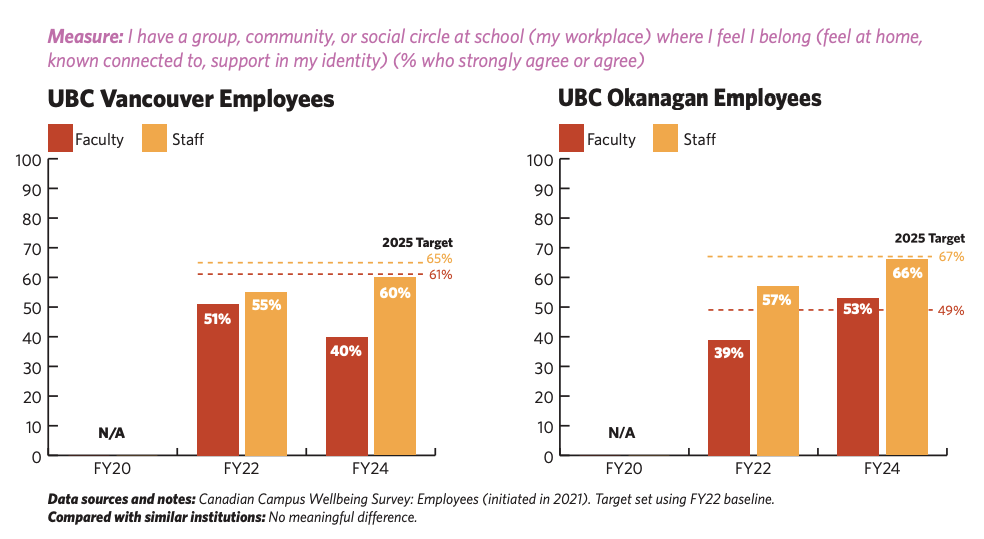
![]()
Metrics
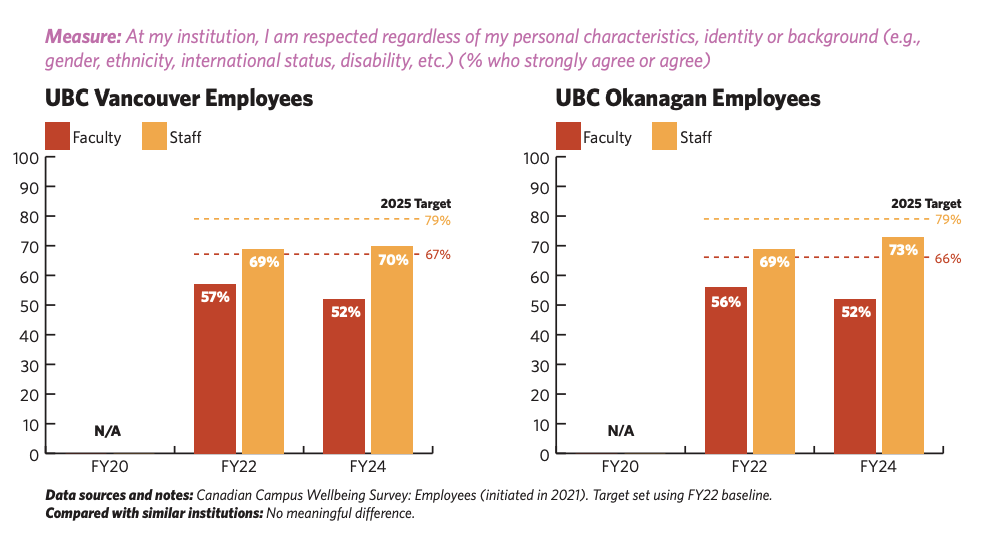

Featured Stories
Below is a selection of initiatives from 2023-24 highlighting the ongoing work to advance Physical Activity.
Wellbeing Break Commitment Pilot Launches
Launched in winter 2024 after extensive consultation with partners, the Wellbeing Break Commitment Pilot engaged departments from UBC Vancouver and Okanagan campuses to provide a 2-5 minute wellbeing break every 60 minutes during stationary or sedentary meetings, workshops, and classes. The initiative aimed to foster a vibrant campus culture that prioritizes wellbeing.
The pilot involved three units: the Faculty of Health and Social Development at UBC-Okanagan, the School of Economics at UBC-Vancouver, and the Centre for Heart Lung Innovation located in St. Paul’s Hospital. It also partnered with SEEDS and the RES 505: Qualitative Methods in Interdisciplinary Contexts course to explore participants’ experiences.
Wellbeing breaks included a variety of activities such as movement exercises, meditation, breathing exercises, check-ins, and colouring. Reported benefits included improved mental state, productivity, mood, learning new skills, strengthening relationships with co-workers and social connection.
Learn more about the Wellbeing Break Commitment
Break it Up: Analysing the Experiences of Implementers of the Wellbeing Break Initiative Pilot
In collaboration with the University of British Columbia’s Office of Physical Activity, students Lindsay Goodridge and Sveinar Lunde Soldal analyzed the experiences of the people implementing wellbeing breaks into meetings and lectures across three university departments. Through conducting interviews, observations and planning and organizing a break ourselves, they gained insights into the perceived benefits of the wellbeing break, and the factors that facilitate successful implementation of the scheme.
In general, the pilot was well-received by the implementers who remained enthusiastic about future continuation beyond the duration of the pilot. The main benefit of the break was its impact on forming and/or strengthening interpersonal relationships between participants and creating more compassionate and empathetic communities where people are more cognizant of each other’s well-being needs. The factors that influenced successful implementation were categorized according to the four dimensions of the socio-ecological framework and included implementer/participant buy-in, the importance of considering group size and familiarity when designing the break, making it easy for people (to implement) through reducing the burden of organization, and having an overall supportive and well-being-oriented culture surrounding the scheme.
Based on the findings, the team distilled a list of recommendations that are thought to aid successful implementation of the wellbeing break scheme across UBC in the long run.
Resource-specific recommendations:
- Create a shared database where implementers can share resources and experiences of running different types of breaks
- Provide an expanded list of possible break options
- Include suggestions on the contexts where specific breaks (physical/social/meditative) are most useful or effective
- Provide instructional videos for non-physical breaks
- Create a set of accessible resources for participants which:
- Outlines the benefits of well-being breaks
- Includes instructions so that participants can continue to benefit from the breaks in their own time.
General implementation recommendations:
- Define the intention of the break (intended outcomes)
- Consider group size and familiarity of audience when choosing a break
- Consider more social/learning-based focused breaks
- Implementers regarded these as most enjoyable and beneficial for participants
Mind in Motion: Improving Student Mental Health Through Movement
In 2023, the Population Physical Activity Lab (Pop-PA Lab), in collaboration with UBC Counselling Services and the BodyWorks exercise facility, launched an innovative program called Mind in Motion. This evidence-based exercise referral program aims to support UBC students with clinically significant depressive symptoms. It consists of twice-weekly, hour-long exercise sessions over six weeks, complemented by support to encourage self-managed, independent exercise. This program was one of the recipients of the Campus as a Living Lab funding, which focuses on enhancing health and wellbeing across campus.
The pilot program received positive feedback from students, counseling staff, and BodyWorks instructors. All students who completed the program reported significant improvements in symptoms of depression, anxiety, and overall wellbeing. Participants also learned valuable skills on how to engage in exercise to support their mental health and wellbeing.
One student shared their experience with the program: “I just thought it was awesome and I really hope this program continues. I truly think it benefited everybody. I was actually surprised with how much it was helping in such a short period of time. Even when I look back to the start, the amount of confidence I have in my physical ability has increased immensely. It’s solidified the idea that if I’m feeling bad, I can go for a run or do something active and feel better. Exercise helps you eat better, sleep better, and feel more confident. Overall, I think it’s a great tool.”
Looking ahead, the Pop-PA Lab plans to continue and expand the Mind in Motion program. Ongoing discussions with BodyWorks and Counselling Services aim to refine and improve the program to best reach and benefit students in the 2024-2025 school year.
Learn more Mind in Motion
Exploring the Relationships Between Body Image & Movement
On February 6, 2024, UBC Recreation's Move U Crew invited CAYA Health Centre to host a hybrid workshop on "Exploring the Relationships Between Body Image and Movement", in support of Move UBC. In this recorded workshop, Registered Dietitian Stephanie Dang (she/her) and Registered Clinical Counsellor Dr. Veronica Li (she/her) lead a two-part workshop on diet culture, body image, self-criticism, and the impacts on self-esteem. Stephanie guides viewers through dismantling diet culture, providing strategies for cultivating a balanced and mindful relationship with food. Dr. Li explores the connections between body image, self-criticism, and the influence on self-esteem. View the recorded workshop below.
Watch the recording
Student-Designed Wellbeing Breaks with a Climate Focus
To advance the goals outlined in the UBC Wellbeing Strategic Framework, the Canadian 24-hour Movement Guide, and the Okanagan Charter, the Climate & Movement cohort within the Sustainability Ambassador Program developed a series of Wellbeing Breaks aimed to raise awareness and spur action on sustainability and climate change issues.
The Wellbeing Breaks project was piloted during the Move UBC month in February, offering participants four themed activities: Scavenger Hunt, Nature Art, Guided Meditation, and Directed Nature Walk, each lasting 10-15 minutes.
With a focus on mental, physical, and emotional wellbeing, these sessions connected participants with nature in an urban environment, inspiring reflection and sustainable action. Since then, the Wellbeing Breaks have been integrated into the UBC Move U Crew's Movement Breaks and implemented in lectures, seminars, meetings, and events across the UBC Vancouver campus.
Learn more about Sustainability Ambassadors
14th Annual UBC Faculty and Staff Sports Day
The 14th annual Faculty and Staff Sports Day returned to UBC’s Vancouver and Okanagan campuses for in-person, inclusive, fun activities, hosted by UBC Human Resources and Recreation in spring 2024. Offices, departments, and groups of colleagues formed teams of 4-6 individuals across both campuses to compete in a variety of physical and intellectual challenges and team building activities, and fun!
Vancouver Campus
The event debuted at a new South Campus location, featuring venues like the Doug Mitchell Thunderbird Sports Centre, UBC Tennis Centre, Thunderbird Park, and the BodyWorks Fitness Centre. A total of 136 teams with 732 participants from various departments and units attended, with many dressed in costumes or matching apparel, adding to the festive atmosphere.
Okanagan Campus
On the Okanagan campus, 50 teams comprising over 300 faculty, staff, and graduate students took part in the event. Participants enjoyed the games and gathered afterwards to celebrate at the closing ceremonies, enjoying refreshments.
On both campuses, dedicated groups of volunteers helped bring the campus community together for a day of fun and social connection. The post-event celebrations included refreshments, recognition of winners and outstanding participants, and opportunities for social interaction.
Learn more about UBCV Sports Day
Inspiring Collaboration: Fostering Wellbeing in Future Educators
The 2023/24 academic year saw the UBC Education Students' Association (ESA) take a leading role in promoting health and wellbeing within the Faculty of Education. By collaborating with various groups like the Move U Crew, the UBC Physical Activity Committee, and UBC Wellbeing, the ESA organized a series of engaging athletics, health, and wellness events, attracting over 1,000 participants.
These events fostered a strong sense of community, allowing future educators to explore new passions and connect with opportunities beyond their program curriculum. From early morning breakfast gatherings to bunny therapy and invigorating movement breaks, the ESA provided a diverse range of activities to the teacher candidates in the Bachelor of Education program. This holistic approach exposed future educators to a wealth of resources and activities they can integrate into their classrooms, positively impacting not only their own wellbeing but the wellbeing of their countless K-12 students in the future.
The ESA's initiative exemplifies the power of collaboration in building resilience across UBC communities. It demonstrates how, as a faculty, association, and wider UBC community, working together can create an environment where wellbeing is not just practiced but actively taught and shared. By fostering these connections, the ESA empowers future educators to become champions for student wellbeing, creating classrooms that prioritize a healthy and thriving learning environment.
Enhancing UBC Recreation: Key Findings from the KIN 464 SEEDs Projects
Through the KIN 464 SEEDs projects that took place during the 2023/24 academic year, student groups investigated various topics on behalf of UBC Recreation to ensure programming and facilities meet the needs of the UBC community. Some key findings include:
- Women’s Only (Trans Inclusive) Leagues: 43.6% of respondents did not know about the Women’s Only (trans-inclusive) league.
- Sleep: Common barriers to quality sleep include stress, lack of time, time management, anxiety, mental health, socialization, lack of desire to sleep, and commute time. Respondents reported an average of 6.76 hours of sleep per night.
- Choosing a Fitness Facility: Commuter students have additional barriers to using campus facilities, such as the inconvenience of needing to bring toiletries and clothes, as well as limited hours of operation. Students with disabilities value staff interaction, accessible equipment, and noise-sensitive spaces.
- Bouldering Spaces: There is high interest in expanding UBC’s bouldering space and making the UBC space their primary bouldering location should it be expanded (n=358). Additionally, there is a desire for introductory courses.
- Outdoor spaces: There is generally high awareness of spaces, though concerns about safety due to lack of lighting and weather conditions were noted.
- Personal Training/Fitness Mindsets: Mindsets contributing to achieving fitness goals include maintaining discipline, having a reward-based system, and practicing self-positivity. Recommendations include offering shorter sessions during exam periods and allowing clients more control over their program
The student groups contributed their findings in reports that can be found in the SEEDS Sustainability Library – a comprehensive repository of applied student research and knowledge. This library includes a diverse range of interdisciplinary, student-led research projects that use the Campus as a Living Lab. These open-access applied research reports contribute to a body of knowledge, learning and action to ignite sustainability ideas, policies and practices, enabling the broader community to learn, apply and build on previous research.
Read the full report
Targets & Indicators
Below are data metrics for the Wellbeing Strategic Framework targets and indicators relating to Physical Activity.
![]()
![]()
Metrics
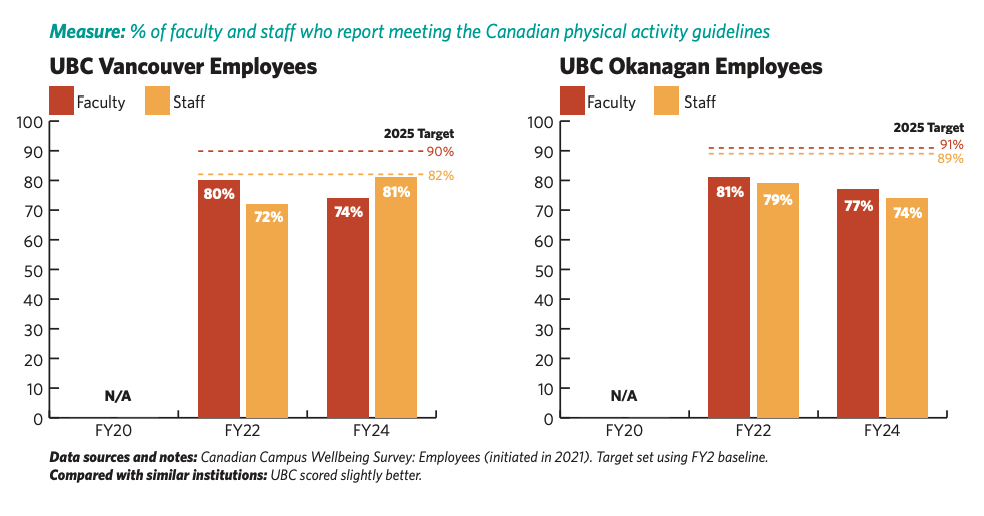
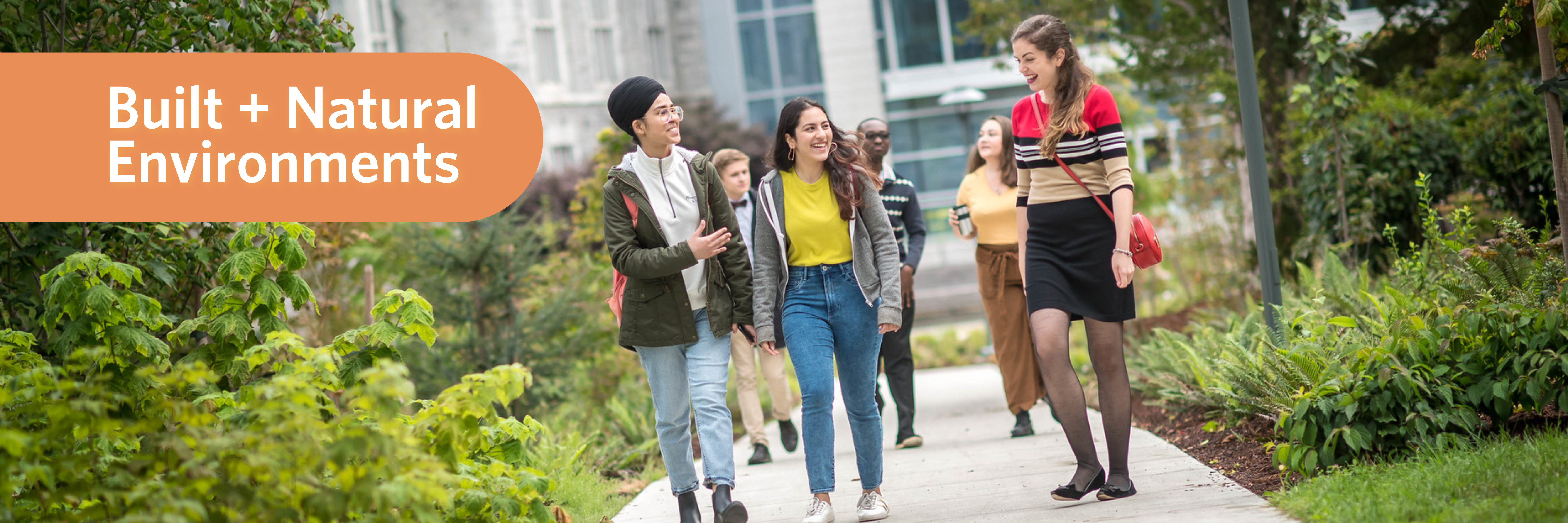
Featured Stories
Below is a selection of initiatives from 2023-24 highlighting the ongoing work to advance Built + Natural Environments.
New Spiritual & Multi-Faith Space Opens on Okanagan Campus
In November 2023, the Spiritual & Multi-Faith Space in the University Centre opened to welcome the diverse spiritual and multi-faith practices of the UBC Okanagan campus community. This student-driven model for spiritual wellness aims to be inclusive of the rich diversity of campus interests and reflective of the vision of UBC as a “Place of Mind”.
Students, faculty and staff can use the space to pray and meditate, engage in conversation with peers and colleagues, read and reflect on sacred texts, and celebrate holy days as well as everyday moments of life.
Alongside the Spiritual & Multi-Faith Space, a new multi-faith chaplaincy was established to further support the UBC Okanagan community. The multi-faith chaplaincy has partnered with several units within Wellbeing and Accessibility, including Picnic. They have also collaborated with the Global Engagement Office on a spiritual-cultural event and worked with the Centre for Learning and the Office for Equity & Inclusion to draft protocols around religious exemptions during exams.
Both the Spiritual & Multi-Faith Space and the multi-faith chaplaincy were student-led initiatives with financial support from the Student Union and AVP’s Office. Future plans include a Spirituality Pod, funded through support from UBC Giving Day and a StEAR grant, to be installed adjacent to the Wellbeing Office in Summer 2024.
Learn more about this space
Honouring Two-Spirit Unity: Coast Salish Two-Spirit Mosaic Mural Installed
In November 2023, a Coast Salish Two-Spirit Mosaic mural was installed west of the First Nations Long House (FNLH) building on West Mall at UBC’s Vancouver campus. This mural, representing Coast Salish Two-Spirit unity, dignity, and respect, was designed by Mack Paul (xwməθkwəy̓əm) using traditional Coast Salish art style and shapes, incorporating the rainbow Pride symbol already used by the settler LGBTQ+ community.
The mural was created to support Two Spirit/Indigenous LGBTQ+ programming in our communities and to acknowledge the land, identities, and experiences of Two Spirit ancestors and relatives. Staff from Facilities, Campus & Community Planning, and the Equity & Inclusion Office collaborated closely with Musqueam to make this a permanent Two-Spirit Pride Installation on the UBC Vancouver campus a reality.
The mural’s location was chosen for its close proximity to the First Nation’s House of Learning, an important place for Indigenous students, faculty, and staff, and home to the first Indigenous Collegium on campus. This mural installation was completed with the help of the Facilities’ Construction Office within Asset Replacement & Improvement.
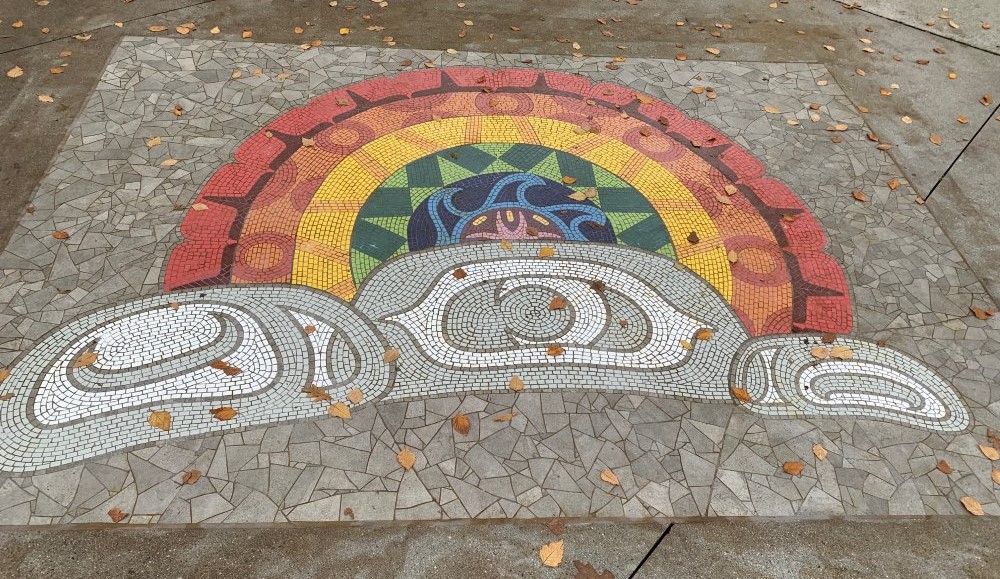
SYMBOLISM: Red represents Fire; Orange represents Vision or Visibility for Two Spirit People; Yellow is the Sun; Green shows the Land, where our Identity comes from; Blue represents Water; and Purple depicts the məθkwəy̓ plant (from Mack’s territory), representing the ecosystems of different Coast Salish territories. The rainbow design is cradled by Coast Salish clouds.
UBC Opens New Student Residence on Vancouver Campus
In August 2023, the University of British Columbia opened the new Brock Commons North student residence building, adding 316 beds for students studying on Vancouver campus.
The 18-storey, $59 million building is part of the Brock Commons residence area, which includes Tallwood House (completed in 2017 with 404 beds) and will finish construction in spring 2024 with the addition of Brock South (282 beds). The total construction costs for the North and South residence buildings is $165 million.
“We’re excited to welcome student residents to North and give more students the opportunity to live on campus,” said Andrew Parr, associate vice-president of UBC Student Housing and Community Services. “We know the Vancouver rental market presents affordability and access challenges for some students. Being able to provide below market rate housing for students is a key goal for the university.”
Learn more about Brock Commons North
Improving Access to Active Transportation: Mobi Bike Share Expands to UBC Vancouver
In November 2023, UBC launched the first Mobi bike share station on the Vancouver campus, connecting the university to the City of Vancouver's public bike share network. This expansion enhances access to sustainable and active transportation options for the UBC community, providing access to over 250 stations, 2,000 pedal bikes, and 500 e-bikes across the Mobi system. By March 2024, more than 2,000 bike share trips were recorded to or from campus.
By the end of 2024, up to 13 on-campus stations are expected, allowing Mobi bikes and e-bikes to be docked and undocked at any of Mobi's stations throughout UBC and the City of Vancouver. To support this expansion, a discounted annual pass has been introduced for UBC students, faculty, and staff, with over 250 passes already subscribed to date.
This collaboration between Campus + Community Planning, Mobi, and the City of Vancouver not only enhances sustainable transportation options on campus but also supports UBC’s climate action goals.
Learn more about Mobi
Zen Den Supports Early Childhood Educators at UBC Vancouver
With support from the UBC Wellbeing Strategic Initiative Fund, UBC Child Care on Vancouver campus created a Zen Den at the Child Care Administration Hub. This calming space is designed for staff working as Early Childhood Educators to decompress and re-energize away from their childcare settings.
The Zen Den provides a dedicated and intentional area where childcare employees from various Student Housing & Community Services locations can relax and take a break from their day-to-day work. This space aims to support the mental, emotional, and physical wellbeing of staff, by offering a peaceful environment for decompression. Additionally, the Zen Den promotes sustainable practices by encouraging the reuse of items within the space, such as throws, cushions, journaling material and other wellness items.
Learn more about the Zen Den
Opening of the New Graduate Life Centre
In January 2024, UBC opened the Graduate Life Centre, a "home away from home" for graduate students. Located in Thea Koerner House on the Vancouver campus, the Centre offers a welcoming space with a self-serve kitchen, study room, social lounge, and a child-friendly space with an interactive games floor. The Centre is open during the week and is accessible to students using their graduate student card.
Special attention was given to conserving the heritage elements of the building, incorporating sustainable practices, and ensuring that the space will support the diverse needs of graduate students on campus.
Additionally, the Graduate Student Society (GSS) has introduced the GradsEatWell program at the Centre, providing affordable food options for students.
Learn more about the new Graduate Life Centre
Inspiring Community Grants Fosters Campus Connections
In partnership with Campus + Community Planning and Vancouver Foundation’s Neighbourhood Small Grant program, UBC’s Inspiring Community Grants award up to $500 towards projects that foster community building and connectedness on campus and in the Musqueam community. Since 2016, these grants have funded over 200 initiatives led by UBC students, faculty, staff, and residents of all ages.
Each year, a committee comprising UBC community members – including students, faculty, staff, alumni and residents– reviews and selects grant recipients. Here are a few highlights from the past year of grant-funded projects:
- Flamingo Farsi: Recognizing the need to preserve Iranian heritage among young Canadian-born and immigrant children living at Acadia Park, a campus resident-initiated Farsi language classes. These classes not only teach reading, writing, and speaking skills but also foster cultural awareness.
- Folil Trafun- Connecting through Indigenous films: Folil Trafün (Joining roots) showcased Indigenous and Afro-diaspora films made in Latin America and Canada, sparking dialogues to deepen understanding and their relationship with local realities. The three-day event showed multiple films and held discussions each day across UBC.
- Open Soccer for Women: Nine soccer sessions aimed at promoting women’s participation in sport, introduced women of all levels, ages, and abilities to the joy of the sport.
- Story and Music Circle Time: Recognizing the lack of accessible and affordable programming for babies and new parents, an Acadia resident organized free weekly circle time sessions. These sessions included story time, music, and socializing opportunities for caregivers and infants.
- Indigenous Mental Health and Wellbeing Orientation Event: Designed to support new Indigenous students, this event facilitated connections with the Indigenous Mental Health and Wellbeing team for resources and support.
Targets & Indicators
Below are data metrics for the Wellbeing Strategic Framework targets and indicators relating to Built + Natural Environments.
![]()
![]()
Metrics
Download the infographic
Click below to view a summary of wellbeing highlights from across UBC.
DATA IN THIS REPORT
Targets and metrics in this report aim to give a snapshot of our campuses and were selected in consultation with a number of stakeholders. Learn more about the data here.
Get in touch
If you have questions about this report, please email ubc.wellbeing@ubc.ca.
